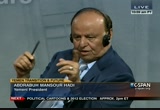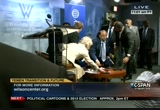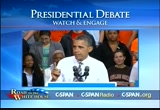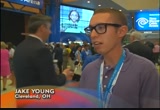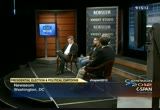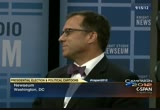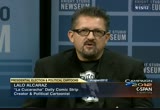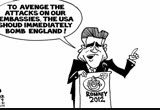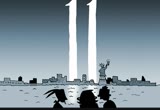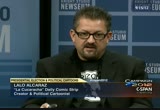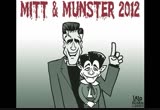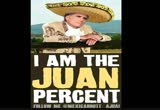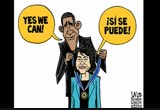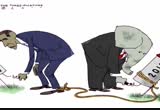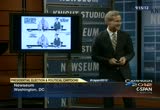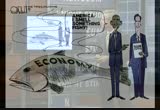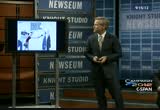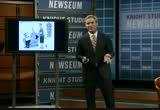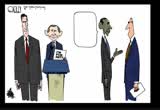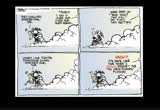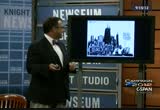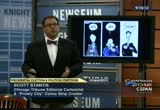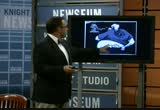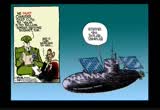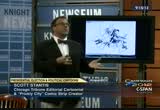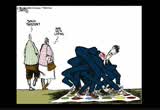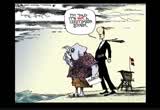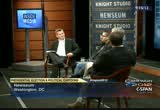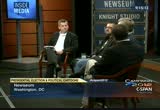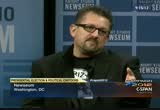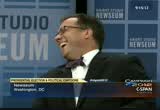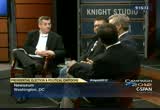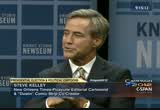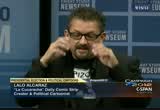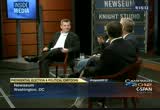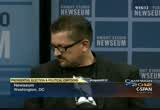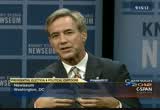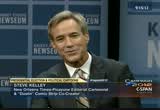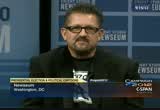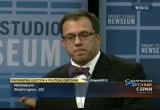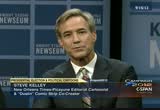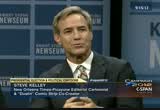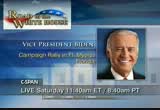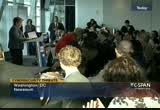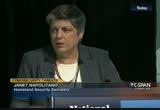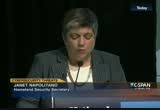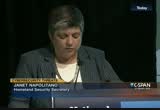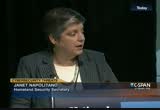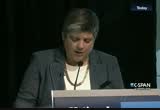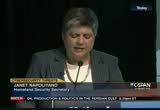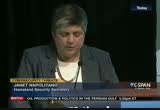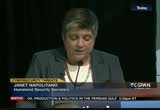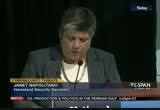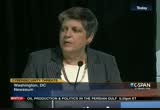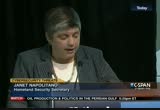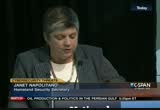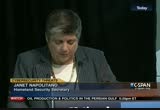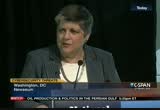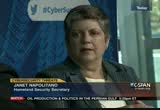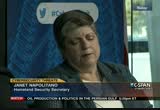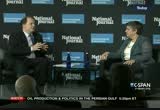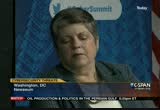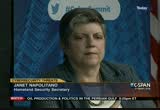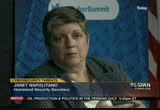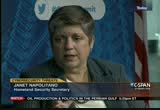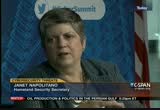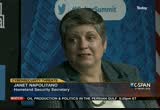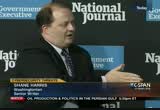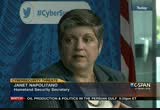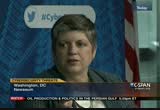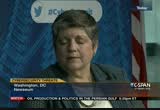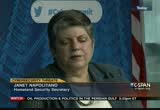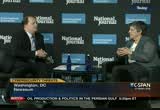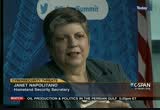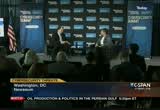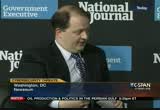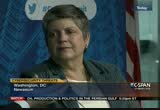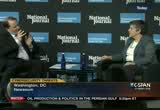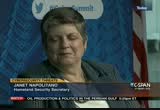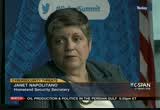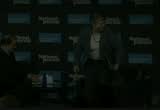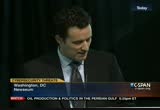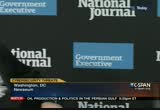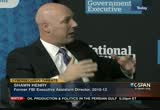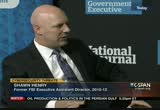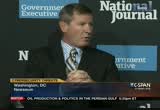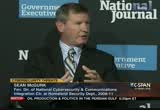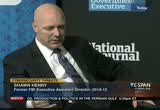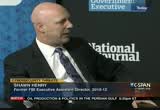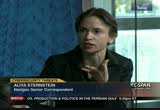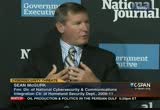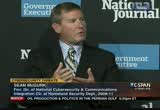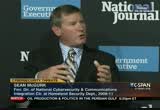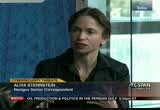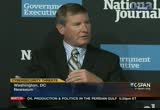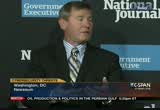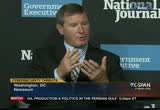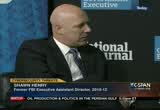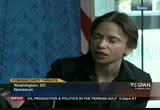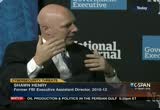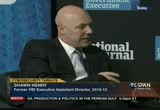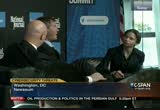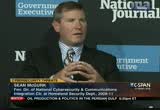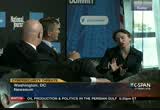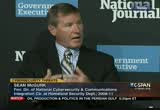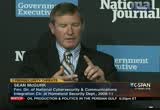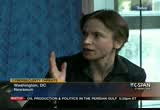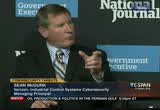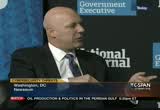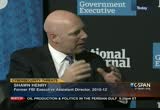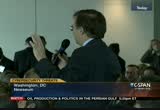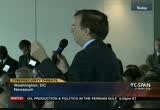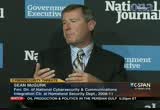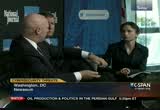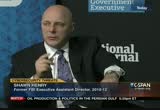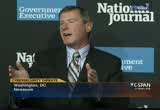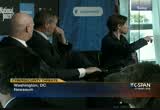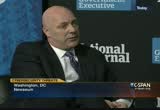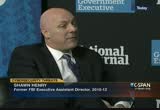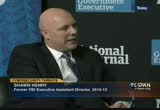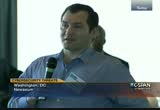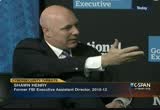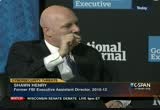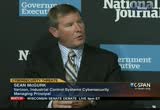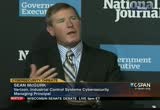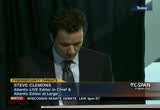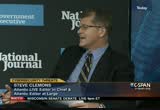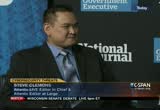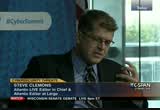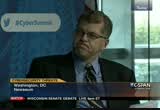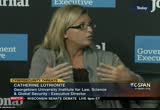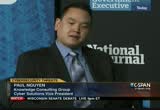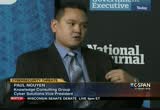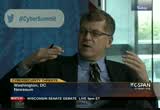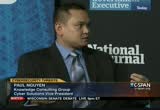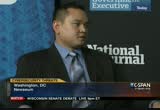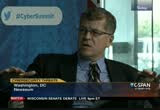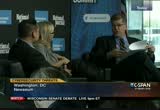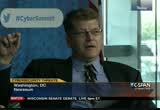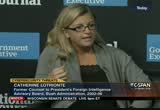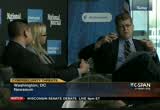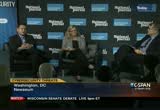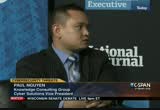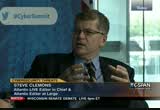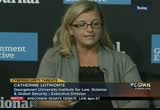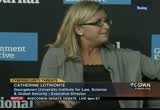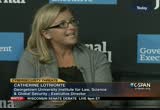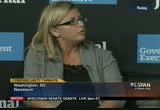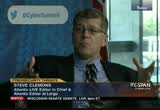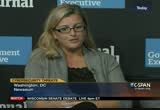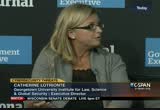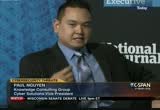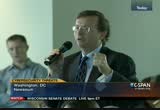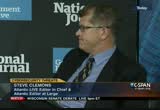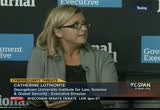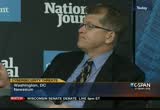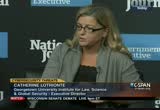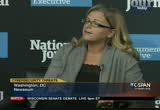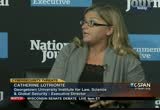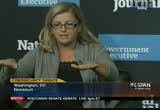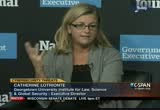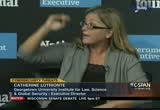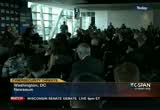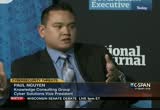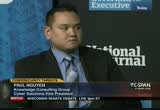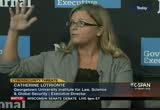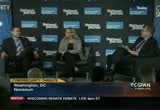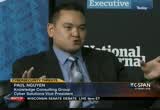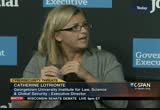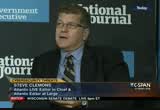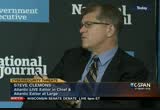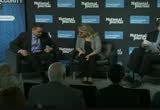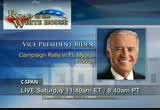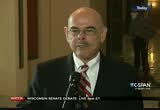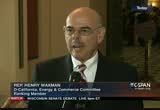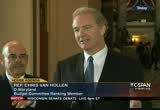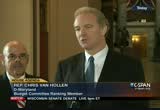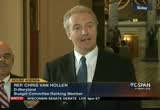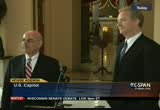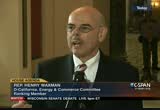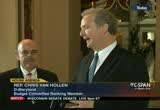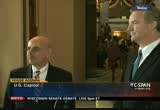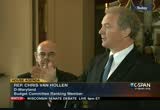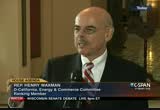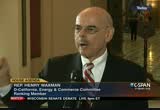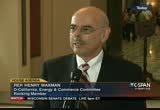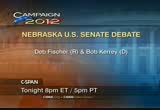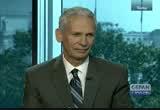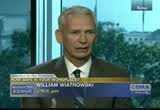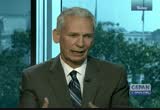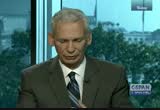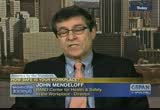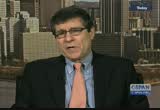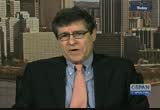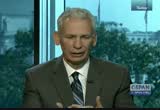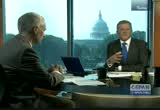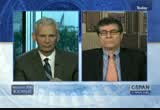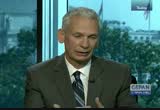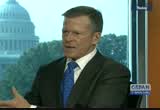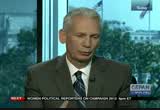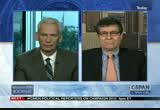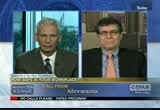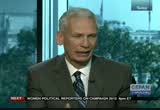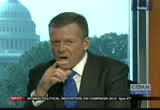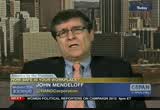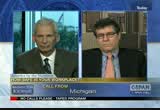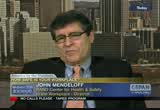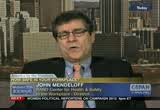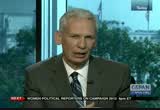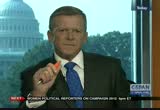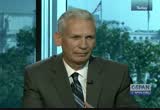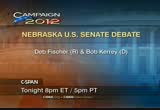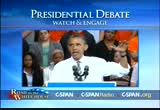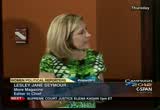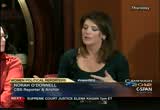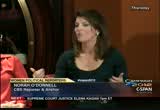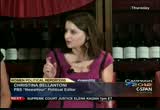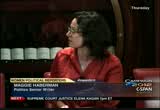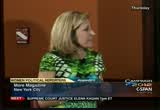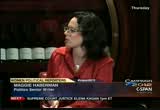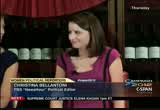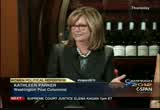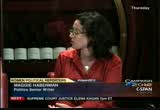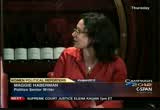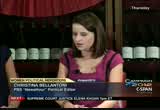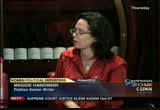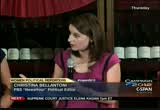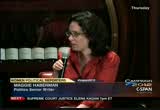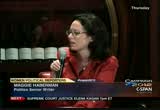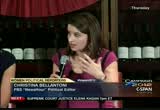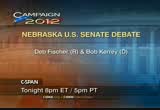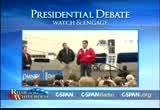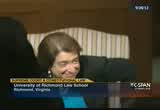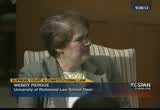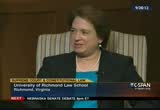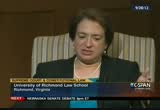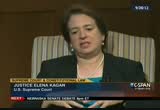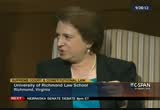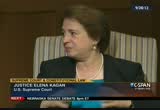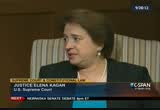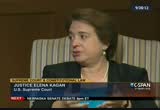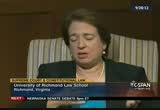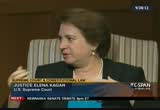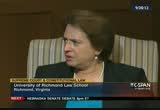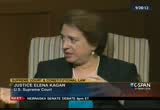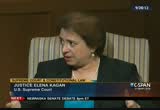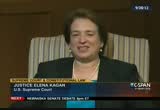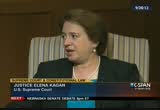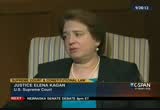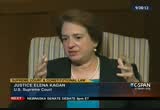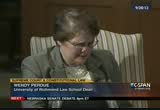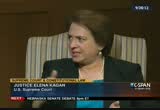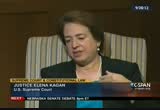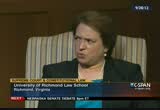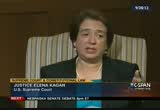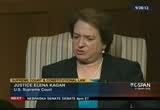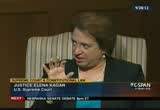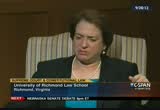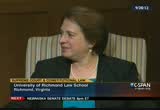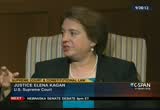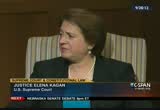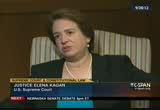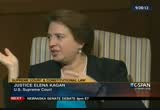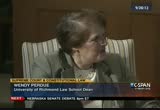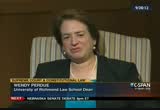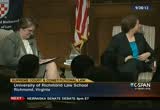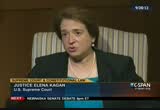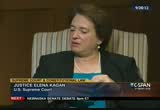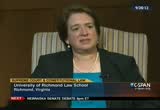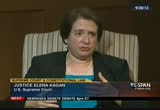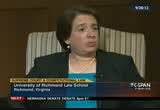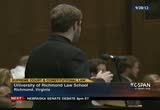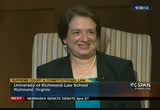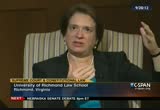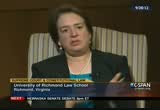tv Politics Public Policy Today CSPAN September 28, 2012 2:00pm-8:00pm EDT
2:00 pm
we tried the cold war and we were in fighting. one believes in is lawmen the other believes in marxism. and we fought each other. so the north will fight the south or infighting with in the south and north. and still weuntil we were unite0 and we agreed on political rights. now, the government is across the border from the political spectrum in yemen.
2:01 pm
therefore, any government will eliminate any component. this will not do yemen any good. we are in need of an inclusive approach, so we will make this initiative work. thank you. >> thank you, congresswoman. [applause] >> thank you very much. i was watching the clock. thank you. [captioning performed by national captioning institute] [captions copyright national cable satellite corp. 2012]
2:02 pm
>> tonight, more campaign 2012 coverage with a live wisconsin senate debate. current congresswoman tammy baldwin debates former health secretary tommy thompson, who is a republican. the debate is hosted by the wisconsin broadcasters association, and it is courtesy of wmvs tv in milwaukee. you can see it live on c-span, listen on c-span radio, or watch it live online. tomorrow on "road to the white house," vice president joe biden holds a campaign rally in fort myers, florida, as part of his
2:03 pm
campaign tour through this battleground state, which began today in bogor raton -- in boca raton. \ we will have that live tomorrow beginning at 11:40 a.m. eastern here on c-span. >> my opponent and his running mate by big believers in top- down economics. they basically think that if we just spend another $5 trillion on tax cuts that favor the very wealthy -- [crowd boos] >> don't boo. vote. vote. [cheers and applause] >> he has won no idea. there is one thing he did not do in its first four years he said he will do in his next four, which is to raise taxes. is there anybody who thinks raising taxes will help grow the economy? >> no. >> his plan is to continue what he has done before. the status quo has not worked. we cannot afford four more years
2:04 pm
of barack obama. we are not going to have four more years of barack obama. memo wednesday, president obama and mitt romney meet in their first presidential debate -- >> wednesday, president obama and money in the first presidential debate, hosted by jim lehrer from "the newshour." follow our live coverage on c- span radio and online at c- span.org. >> they just tell you the news straight up. there's no ads. that is arguably the biggest reason. i am a firm believer that the c- span video archives are truly a gift to the american people. it is arguably one of the most historical -- i would say one of the most historical archives there are. i primarily watch the "washington journal," the house of representatives proceedings, and c-span2 for the u.s. senate.
2:05 pm
>> jake young watches c-span. c-span -- created by america's cable companies in 1979, brought to you as a public service by your television provider. >> 3 political cartoonist presented some of their favorite works over the past year during and even recently hosted by the newseum in washington. they talk about which presidential candidate they would like to draw for the next four years and discuss how the media is changing a particular need in the news business >> -- particular niche in the news business. >> good afternoon. welcome to the newseum. if you have been walking through the city, you may have noticed a
2:06 pm
large number of in-state citizens. do not be alarmed -- the cartoonists are in town. today is day three of the convention of the association of american editorial cartoonists. the newseum was lucky enough to snag three cartoonists, who today will share some of their work and give us their take on the sometimes hysterical campaign season. seated to my left is lalo alcaraz, the creator of the first nationally syndicated politically themed latino daily comic strip, which is seen in scores of newspapers, including the "los angeles times." is also created editorial cartoons in english and spanish for university -- universal press syndicate. he co-host a satirical talk show. seated next to him is steve kelley, the editorial cartoonist
2:07 pm
for the "times picayune" in new orleans. he is also the co-creator of nationally syndicated comic strip and was also a veteran stand-up comedian and has appeared several times on the "tonight show." scott stantis on the far left is the editorial cartoonist for the "chicago tribune," and his work is syndicated to well over 180 newspapers. previously, he served as editorial cartoonist for the "commercial appeal court and in memphis -- "commercial appeal" in memphis. please welcome our panelists today. [applause] with that, i will now turn it over to lalo, who will start us off. >> hi, everybody.
2:08 pm
i am lalo alcaraz, cartoonist, it says clearly there. [laughter] i am, i guess -- i have been a freelance or forever -- freelancer forever. i have never been a staff cartoonist. even when i was with "l.a. weekly," i was there 17 years as a freelancer, and it taught me how to manage kind of my own career, as far as being self- sustaining, non-broke cartoonist, trying to raise a family. [laughter] so i have got a lot of cartoons to show you. let's just go to -- yes. there it goes. [laughter] of course, we just went through the conventions. this idea actually -- you know,
2:09 pm
people ask where the ideas come from. sometimes it is a bolt from the blue. sometimes chris rock writes them. this cartoon is actually something chris rock said on twitter, and i credit him on the right. he said, "you know what they should do at the dnc? just have an empty chair that says osama bin laden on it," a la clint eastwood. this is another cartoon i did. [laughter] this is a cartoon -- actually, i had it in my comic strip. what we each have in common is that we each have these -- well, i don't know. i'm not sure if justin is a --
2:10 pm
if it is a political strip or a strip about a little boy. i promised i was not going to mess up your comic strip. anyway, we each do comic strips, so we are lucky as far as we are editorial cartoonist, and we get to do the other side of our brain to comics. i have been accused of making minor way to political, but sometimes, you have just got to be somber and mellow. this is my 9/11 trivia -- tribute. it actually was originally horizontal, so you had to turn your head to see it, but i made it into an editorial cartoon. here is mitt romney. [laughter] having a candlelight vigil. for osama bin laden. you know, he is very sad. this is a cartoon i did the year
2:11 pm
after 91. about maybe some of the causes behind 9/11. turmoil in the middle east. this idea is also the year after 9/11. it marks, you know -- i call it the 20 piece -- between t -- the twin teepees, and it marks the genocide that also happened -- it is a reaction to some of the more excess of, i think, chest beating about 9/11 -- some of the more excessive chest beating about 9/11, and we never remember the other tragedies that happen on american soil. [laughter] i do not really have anything to say about this. [laughter] i think the ladies know what i'm talking about.
2:12 pm
self-the port, self-aboard, we are the party of self-reliance -- self-deport, self-abort. here is bill clinton at the democratic convention playing saxamaphone. it was either a arithmetic or facts. i was not sure what to put, but to me, -- it is kind of pathetic. democrats were all waiting for somebody to come up and spell out these things clearly, which, apparently, it took bill clinton to come out and say something that democrats felt excited and a rally of about. there might be a communication problem in the white house. here is chris christie speaking at the rnc. [laughter]
2:13 pm
mitt is down there saying, "don't forget to mention my name, chris." here is a guy running around the republican convention. gops not easy being a convention minority seat filler ." [laughter] clicker. [laughter] nothing to say there. i think the ladies know what i'm talking about. vp choice paul ryan appeals to seniors. scary eddie munster guy. \ here is mitt romney's money. [laughter] chillin'. [laughter]
2:14 pm
i know a guy that does this fit twitter account called mexican mitt romney -- fake twitter account called mexican mitt romney. he is a big smash on twitter. he was named one of the funniest fake political tour counts. his slogan is -- [laughter] -- one of the funniest fake political twitter accounts. it plays off on the fact that mitt romney -- his dad was born in mexico in, you know, a mormon colony. mitt romney may be the first chicano president. mexican mitt romney just is, like, a crazy mexi-mormon ranchero character, and he says a bunch of crazy things about the election. follow him @mexicanmitt.
2:15 pm
this is the mars rover being asked for its papers. here is the colombian secret service prosecution scandal. [laughter] a message from the colombian ministry of tourism. "we're not just known for drugs anymore." [laughter] "i promise you the president has a big stick." here is obama giving the presidential medal of freedom to dolores huerta, a personal friend of mine. a lot people do not know the farm workers invented the "yes we can" slogan. it is "si se puede," and obama took that and ran with it. at least he paid it back with a
2:16 pm
medal. i do a lot of work about the dream act. the color is wrong on this, but it is "occupy los angeles," with the monopoly guy being torn down. also the colors are wrong here. [laughter] yes, i did well with arizona. [laughter] geronimo. and arizona again. rightm wearing this shirt here. it is called "liberty is on the run," and this was used by the indigo girls rock band as a poster through arizona and alabama, the deep south -- arizona and alabama. georgia. i put this on my facebook page, and people were like, "i love this image, but why do you have three president punk rockers running across the island?"
2:17 pm
[laughter] of then -- oh, here's some my -- all this. how are we doing on time? >> we are good. >> i did this in february 2008. soon after, "the new yorker" did i guess a much nicer version, but i have psycho fans they get online and complain about when they perceive people are ripping off everything cup -- ripping off anything, but i make nice with "the new yorker." this was my campaign poster in 2008. i have heard on fox news, which i hear is a reputable source of journalism -- [laughter] that latinos were so racist they were not going to vote for a black candidate. so i did my ideal latino campaign poster, which was "viva obama." the l.a. campaign loved it. the california campaign was not
2:18 pm
so sure, and the national campaign would not even touch it. i go, "well, come on, he is a black guy with a gun." [laughter] what is not to love about that? the nra cannot say crap about that. i was really depressed about politics. i did this one about the nike swoosh. i did not do that, but i wish i had. i did paris hilton as che guavara. -- guevara. bennett did george w. bush. [laughter] i licensed the heck out of this image, and i had a t-shirt on one time and i was in a store in east l.a., and a little homey came up to me and said, "yo, 'planet of thess apes' shirt."
2:19 pm
i was like, "you're so close, mijo." [laughter] [applause] >> and your spanish is so good. [laughter] this is just a look at the election as it shapes up. i drew this cartoon about a year ago, obama trying to ignite the economy. the republicans are trying to -- well. [laughter] this is an illustration. it is several panels long of what the problem really is. you know, we complain about democrats and republicans running for the presidency, but it is really the guys in congress who are the problem. this is kicking the debt can down the road. and then, of course you -- [laughter]
2:20 pm
to get up because i cannot read it from here. i'm getting old. out wass pull- disappointing. i am glad newt is running, but i'm really hoping for sarah palin." "you republicans are getting desperate." "actually, i am apolitical cartoonist." [laughter] sarah palin -- "i have that fire in my belly." "i know the feeling." the best thing you can do with a politician in a political cartoon is to use his own words against him. this is soon after the president's state of the union address. "we've come too far to turn back now." [laughter]
2:21 pm
donald trump and mitt romney over there. "you guys hold him down, and i'll cut his hair off." [laughter] obama is pointing at mitt romney and bain capital. "america, i smelled something fishy." there we go. [laughter] am i not pointing this at the right thing? there will go. this is the president painting the economy over there, which is wilted, but if you concentrate on -- [laughter] we have flip-flops here. government health care, and for obama it was safe-sex marriage, and mitt romney says, "you get
2:22 pm
used to it." these are the obamacare sparklers. and there it is. [laughter] the tea party. that is mitt and paul ryan. "you are not really my tight, but your wing man makes you irresistible." do youupport chick'fil'a's ceo on traditional marriage, or do you favor activists' calls for a nationwide boycott? "i miss the separation of church and fast food." [laughter] ok, this is not talking to the machine very well. "family net worth of 3% -- off
2:23 pm
40% in three years." the woman says, "do we support the failed policies that got us into this mess or the failed policies that have not gotten us out of it?" i am is a big believer in just opposing stupidity. people ask if i'm a liberal or conservative, and i say i'm really need there, but really anti-to become a witch, of course, leaves you with no representation in washington -- really anti-stupid, which, of course, leaves you with no representation in washington. [applause] this is why it is best the president is not going to be one bit -- the london olympics. you did not win that. united states open, it is either about the golf competition or the president's immigration
2:24 pm
policy. there we go. that was like a boo-hiss on that one. this is back when there were calling each other names. i think they should get back to the fictitious platitudes voters care about. in the poll vault -- it says "jobs" on there. in favor of a mitt romney and -- this is when george bush came out in favor of mitt romney and endorsed mitt romney. now if things do not go well in november, i cannot blame bush. mars mission, why are we spending $2.5 billion on mars when we could be spending it to dig up dirt on mitt romney. with the race tightening, some say you should look for another running mate. i could never do that to barack.
2:25 pm
[laughter] and this is in the men's room at a restaurant. and obama says, how about seconds? that is my big -- [applause] there we go. it is working now by the way. >> hello. you the art ofow issues that came into 2012, i hope. this is one of the things, i will have to walk over here. i am old and cannot see as well. it is the statue of liberty. now this one is how you get your wife not to talk to you for two days. this was justice blackmun, who wrote the roe v wade decision, passed away. he is in front of the gates, in front of the pearly gates. all of these babies saying, what trimester were you in?
2:26 pm
yes, it gets that reaction a lot. my wife and i have been married for 31 years. and to tell you our relationship, in 1998 we were expecting our second child, and she was then labor, ready to burst labor, this was election day 1998, we stopped by the voting place so she could cancel out my vote. [laughter] [applause] that dovetails into how we can be friends in editorial cartooning circles. we disagree on the stuff. i am to the right. i worked on reagan's campaigns. i could bore you with the rest, butbut we still share the same values. we want our kids to go to school that teach them. how we get there, a little different routes. the iraq war, and there is
2:27 pm
france on the tread. i just want to point out, if you drop a squished poodle,that is cartoon excellence. i do believe in the culture of life. i am against the death penalty, abortion, euthanasia. i think there's room for discussion on those issues, and people of good faith can disagree. this was, they executed another one, sir. and god says, i say it over and over again. what part of thou shalt not kill do they not get? angell says they are strapping on another one. and god says,it is days like this when i really regret the note floods -- no new floods pledge. and privacy is a big issue for me. i really diverge from where the republican party went under george w. bush, andwith the patriot act i opposed it. here is our current secretary of homeland security setting, do not mind me, as the announce you can also watch your e-mails and computer use.
2:28 pm
this is george w. bush saying, can i hear you now? [laughter] this was of course after katrina. we have a -- had a five refuges and our house. my wife is from new orleans. it was infuriating to see fema's reaction. -- we are from fema, we got here as fast as we could. we understand a cow started a fire? [laughter] and this is what i'm talking about. and sometimes the curtains are serious. humor is a great vehicle to express your opinion. but there are days when you take your foot off of your throat. when we are debating security versus civil liberty, and it is an uncle sam -- so, where do i draw the line? i really like the drawing. sometimes you actually talk like you did not draw it yourself. because it turned out well.
2:29 pm
but his posture is tortured. i have always liked this drawing. the president, of course, the current president likes to smoke. claims he spent. -- claims he quit. it is like unfiltered spending. he says i can't seem to quit. and republicans have their problems. people say it is my turn. from bulk, to mccain, to mitt romney. i was lucky enough to cover both conventions. i have to tell you, at the republican convention, it is a little disheartening because the average age of the delegate was almost dead. [laughter] and that is not a good sign for a party moving forward. fidel castro says we are throwing out our old economic model. and the president says, can we have it? and our debt past 100.3% of gdp. and you have a obama setting -- opa!
2:30 pm
i like the strong because it turned out perfectly. this is the tea party. this little girl looks a lot like sarah palin. and she is saying, drink it! [laughter] this was drawn -- michele bachmann had just won the straw vote. and he is looking down and he has a tramp stamp. dear lord, what did i do last weekend? [laughter] and this was when the republicans took the house back. and this does let the honeymoon commence. i love the look on his face. this is one of the things that
2:31 pm
drives me nuts. the new york city council just voted that he was right and they outlawed big drinks, the big gulp. and i have a very poplins dropping it down and saying, drop it chubs. this was one of donald trump endorsed mitt romney. he is saying -- you had me at i do not care about poor people. [laughter] and going back to the president -- he says this is true -- he says we must consider these cuts to our $70 billion green defense budget. and president obama is saying, it was working so well. and the submarine saying -- strike the solar panels. if you look closely, it is the u.s.s. inconvenient truth. this primary season was one of the most exciting, most interesting because they did not want mitt romney. they wanted santorum? really?
2:32 pm
so here is the elephant running away, and he is saying, "something like this could make a lesser fellow question his inevitability." and this is the front-runner. there is mitt. [laughter] steve day one of the most impassioned -- he is sort of right of center -- is that fair? he gave a great endorsement yesterday. a lot of people in the republican party really question the sky. he is in michigan. and he would start his speeches, it is good to be back in michigan. where all the trees are the same size. height. -- right height, i'm sorry. what? maybe he can explain that.
2:33 pm
>> it is a different kind of homey, though. [laughter] going back to obama's small businesses being crushed -- he is saying, you did not build that. and obama is saying, my case for reelection is clear. debt, the economy, free guns for a bad guys, the commerce department. this is again on mitt romney. soloed twister? and he is losing it. superpac's make me crazy. i love the first amendment. i love free expression and democracy. but each candidate could spend over $1 billion each, a $2 billion campaign. i wish someone would come up with a model -- people united, citizens united, we have to find a middle ground here.
2:34 pm
is money speech? is a corporation a person? this is an example of a bad cartoon. it is the truth. it is the fast and furious case. we gave dunnes to bad guys. -- they gave guns to bad guys and lost track of them. and there were killed to kill an american officer. it is the non-smoking gun. this says we are spending more than we are taking in. and? and the reaction to what is happening in syria. assad is there, and our friends russian and china. and the president says president putin -- and he says not a good time. and the chinese, saying some people have no respect for a
2:35 pm
true artist. and here is the president and a baby bull. forward to november so i can tax you into stake. -- into steak. giddyup! this is the only mohrmann reference i have ever done in a cartoon. -- the only mohrmann reference i have ever done in a cartoon. -- the only mormon reference i have ever done in a cartoon. he is knocking at the door because he has been running for three cycles. finally the elephant opens up the door and says, you win. and when he said about legitimate rape, this is when hurricane isaac was going to go into tampa, so he had the elephant looking off shore, and he is saying, i am told it is not a legitimate storm. uncle sam, it did seem to me
2:36 pm
like a new beginning for mitt romney to introduce himself. and uncle sam is saying, okay, convince me. and at the democratic convention -- are you better off now than you or four years ago. you bet. and the national debt -- it went past $16,000. and the president -- for word. are you better off today than you or two weeks ago? and it just goes off in different slogans, i believe. one more. a woman reading -- the newspaper says they may stop delivering letters on saturday. and the boys says what is a letter? and the girl says what is a newspaper?
2:37 pm
thank you. [applause] we do want to open it up to your questions. >> if you have a question, please raise your hand. i will get the ball rolling on questions. politics aside,who do you want to win in november? mitt romney may or obama? strictly cartoonist speaking? >> mitt romney 8 is much funnier. in a robotic since, he is great. >> i would set my job aside and prefer to of the country recover. i am hoping for a regime change. cartoonists are and the position where what is best for them is not necessarily best for the country. but i think it is too important this time. >> that is why i want romney.
2:38 pm
[laughter] >> i agree. but from a philosophical point of view, i would like mitt romney. but from a cartoonist point of view is always easier to go after the guy you disagree with. >> any time someone has a reputation for salacious behavior, it makes them a rich target for us. and certainly the clinton years, i got out of the office very early every day. that was back when i had a six handicap. [laughter] >> george w. bush was fun for me. he is great to drop. -- to draw. the term progressed, i disagree with him on some of the -- if
2:39 pm
you are conservative and you have a conservative a dental office -- when they screw up and disappoint you -- we kind of expect them to be goofy and silly, but when our guys do it, we tend to be harsher. so my cartoons of romney are pretty harsh. >> and the politicians in the last 20 years? >> i get sick of drawing bush. every day was a tragedy coming from his mouth. when i started, i just met in college cartoonist back at our convention, and brought him back to starting as a editorial cartoonist. i cut my teeth on ronald reagan
2:40 pm
and that was like having george w. bush in office. reagan would say crazy stuff, off the cuff stuff. he was great to draw. i kind of miss reagan for different reasons than you. [laughter] >> we have a question a dented the front. >> i am curious. you said your sometimes considered too political. what does that mean? >> i was talking to in terms of a daily comic strip. we have that issue where, if you have a political comic strip, people will segregate it in another section on the opinion page. or in the l.a. times right under a comic. right under "doonesbury."
2:41 pm
just being a latino and a minority cartoonist, there are not that many of us. almost like anything i say can be considered too political because people want me to shut up. >> i do a political comic strip as well called prickley city. you may consider yourself a minority. i am a french-lithuanians cartoonist. i would challenge you to find another one. >> it is interesting a french man would challenge someone. [laughter] >> i did not say i would not surrender. >> talk to us about prickley city. >> it came as a reaction to "la cucaracha." i thought i could do better. there is one other conservative
2:42 pm
strip out there. and so i was living in the southwest united states. in an environment that will prick you , eat you. and i thought that is politics. i created two cartoons. one is a liberal. one is a conservative. they have this continuing dialogue, and now there is another character that took over the strip -- it is the darndest strip --kevin, the lost rabbani of the apocalypse. he is now running for president. -- the lost bunny of the apocalypse. he is now running for president. >> i started a comic strip and i got a partner because i did not want to have to drop it. i got the best artist in the business. it is about a young man who graduate from college and then moves back in with his parents, kind of a crowded scenario. he works temporary jobs until he screws up and gets fired or the jokes run out. it has been a terrific success. newspapers are not really buying comic strip snout.
2:43 pm
if you are in a 60 papers by the end of the year, consider that a home run. we are and a 320 today. we are in 320 today. it is only 3 years old. >> does it get political? >> it gets political. they talk about some things that are political. the husband is a conservative. and his wife is a radio talk show host is more of a free spirit, liberal minded. you have to build a conflict into a comic strip or sitcom to throw off the humor. you have to bang two rocks together. >> what of the origins of "la cucaracha?" >> i started doing a panel in de l.a. weekly. this is the week after the riot.
2:44 pm
the paper invited me to come in and pitch them a weekly panel. and it was the characters that i had been working on. as the years progressed and realized i was going to die broke in the gutter if i just depended on editorial cartoons, i pitched the comic strip and got it to universal -- a syndicate. it is kind of a latino slice of life. the characters are 20 somethings. they talk a lot of politics at each other. i do a lot of straight political commentary in the strip. but also, when i do latino cultural stuff, it gets the same reaction -- this has no place in the family newspaper.
2:45 pm
because it is shocking to be pro-latino in some places. >> we have a question of debt of the front. -- we have a question in the front. >> thank you. when you are coming up with the idea, do you ever hear from the principal and gratitude or not so much? >> if any elected officials are watching, the best thing you can do is saying, we love the cartoon, can we buy its? what we want to do is tick them off. a quick story, when i worked in tennessee, the governor at the time, every time i did a cartoon about him, his assistant would call up and say that the governor loved the cartoon and could he have it. it started to really ticked me off. over time, i got meaner and meaner, until i did a cartoon of beating an old woman with a walker.
2:46 pm
i'm not kidding. and he called up and asked for the original. i autographed him -- i autographed it to him, "there's just no insulting you s.o.b.'s is there?" >> the attempt is really too savage somebody. and -- it is like a trophy. i always likened it to taking someone in the groin, and they want the shoe. >> i found that politicians and orlebrities's assistants employees are the ones that contact me and they want it for free. but not because the celebrity or politician is in love with the cartoon, but because they want to get this free saying from me. and i am like, i am not stupid.
2:47 pm
i'm not going to give you this. you want to buy it? this happened with bill richardson. former governor of new mexico. he came up to me at a party. he says, yo, homie. he did not say that, but the kind of a said that. he said people pay for your stuff, so, send me the bill. i never did. >> i think it is interesting. politicians have to be very serious and they become a funny. and you guys set out to be funny and it becomes serious. maybe editorial cartoonists should run for office. it is more of a thing -- you have to talk about comics and in a way -- when you go out, are you expected to be funny in your parties?
2:48 pm
or do you really feel more comfortable with a pen behind it and it is a different sense of humor. how does that work? how you handle that? >> i always wanted to go the other way. i always wanted to do stand up comedy. i think most political cartoonists are frustrated stand-up comedians, or they cannot take the fear of rejection. if no one laughs when you are telling a joke, it is hard to deal with. i actually tried stand up comedy after being a political cartoonist for a long time. and it is very frightening. there are only two times in your life where you stand in front of a group of people and there is a brick wall behind you. and one of them is a firing squad. the other is stand up comedy. think about it. [laughter]
2:49 pm
>> this is for all of you. but steve, it is. really your chick-fil-a cartoon that made me want to ask. -- >> did you think that the chik fila cartoon seemed to be casting a diversion? -- adversion? and asking everyday voters for things like protesting on the other? >> do you think the chip fillet curtain was casting aspersions? >> it did seem to be critical of a group using a constitutional right to boycott. >> the carlton asked both questions. do you align yourself more with the ceo, or do you support the people who are protesting? it was not choosing, it was kind of and equivalents. people were saying, this is
2:50 pm
beside the point. they said they missed the separation of church and fast food. they are saying, do we need to take our political battles to a restaurant. it just seems so and congruence to me. -- so incongruous to me. it seems -- i think most people felt that way. that was just such a weird, so real news cycle for a few days. every time you turn on the news or picked up a paper, it was chik fil-a. are you serious? i was trying to give voice to the american public. it was massively beside the point. >> we have time for two more questions. we are going to go up there. >> for all three of you, here for the convention. i was wondering how, you work
2:51 pm
for very large national news organizations. i think lalo works fo rhimself -- for himself. how has the expansion of new media changed the business of political cartoonists in your own -- >> they want to jump on this one. >> i have never been more well known, and been and fewer outlets. some of my papers have gone to the tucson citizen. that is gone. different things. it is a transition for me. my work gets out everywhere. i am licensing myself a lot. i get book deals here and there. so, it has helped get my name out. i will write it for now. i have not figured out -- we
2:52 pm
were talking about this at the convention. what app is going to have your cartoon plus 10 ad attached to it, plus a button where you can send money to the campaign. nobody has done that app. i would like to meet that person. >> years ago, and you have done this as well, my first convention was 1988. back then, you did your editorial cartoon. and you faxed it back to your newspaper and you were done during this cycle i was working 16-18 hours a day, posting videos. tweeting, doing drawings, posting photos, and doing my cartoon for the chicago tribune. and in my spare 2.5 hours of sleep, write the comic strip.
2:53 pm
that is what has changed. we do not know where it is going. a lot of us are going in a different -- a zillion different directions. until the paradigm is established, and i think that will be a good number of years from now. >> you will notice in a lot of my cartoons, you will see someone reading a newspaper. sadly, that is the last places you will see someone reading a newspaper anymore. i am sure a lot of people still read newspapers. a lot of people still love newspapers. my newspaper has decided to go to a 3 day a week newspaper. they laid off many good journalists. and i am among them. was one of the people they laid off, not a good journalist. they laid off many good journalists and me. [laughter] on the 30th of this month, i may already be looking for work elsewhere. it is sad. and although the great new frontier is the internet, we
2:54 pm
really have not figured out collectively how to monetize that yet. industries have not figured that out yet. everybody expects everything for free. society cannot expect that a very good journalism is produced without paying. we send reporters to cover city hall and dispense two or three days writing a story. he has to be paid something for that. cannot expect them to do good work for free. it is such a critical part of our democracy that a free press exists and keeps an eye on these s.o.b.'s. without it, we are looking at a big problems. i like to tell people in new orleans, imagine as bad as city hall is, imagine it without the tribune.
2:55 pm
and you can just see the look of fear in their eyes. i do not know what the solution is. but i am really sorry to hear -- to see it headed in that direction. really am. [applause] >> if that is all of our questions, i think we are done for the day. i want to thank again, lalo alcaraz, steve kelley, and scott stantis. [applause] >> tonight at 9:00, campaign 2012 coverage with a live wisconsin senate debate. current congresswoman tammy baldwin debates tommy thompson, who is a republican. the seat is open due to the retirement of senate democrat herb kohl. it is courtesy of wmvs tv. you can see it live at 9:00 eastern here on c-span, or you
2:56 pm
can listen on c-span radio or watch online at c-span.org. leading up to that debate, we will be at today's senate debate between bob kerrey and deb fischer. \ it happened today in omaha. we will show you that tonight at 8:00 eastern. tomorrow on the "road to the white house," vice president joe biden will hold a campaign rally in fort myers, florida, part of his campaign tour through this battleground state, which began today in boca raton. \ we will have that live tomorrow starting at 11:40 eastern here on c-span. >> my opponent and his running mate are big believers in top- down economics. they basically think that if we just spend another $5 trillion on tax cuts that favor the very wealthiest -- [crowd boos]
2:57 pm
>> don't boo. vote. vote. new idea.t one there's one thing he did not do in his first four years he said he will do in his next four, which is to raise taxes. is there anyone who thinks that raising taxes will help grow the economy? no, his plan is to continue what he has done before. the status quo has not worked. we cannot afford four more years of barack obama. we are not going to have four more years of barack obama. >> wednesday, president obama and mitt romney meet in their first presidential debate. "the newshour's" jim lehrer moderates. what including our live preview at 7:00 p.m. eastern, the debate at 9:00, and post-debate, your reaction. follow our live coverage on c- span, c-span radio, and online at c-span -- online at c- span.org. >> next, a summit on cyber
2:58 pm
security held earlier today in washington. homeland security secretary general public, was among the speakers, saying that congress must act now to address seven security -- homeland security secretary janet napolitano. secretary napolitano says the law being drafted is not the sum all one might hope for. [applause] >> well, thank you, and good morning. happy friday to everybody. happy friday. yes, there you go. i want to thank national journal and government executive for inviting me to this year's cyber security summit because i can think of no more important or urgent topic in today's interconnected world. the cyber domain is woven into the fabric of our daily lives.
2:59 pm
while this increase connectivity has led to significant transformation and advances across our country and, indeed, around the world, it also has increased the importance and complexity of our shared risk. the flip side of all the good that comes from the internet is that cyber attacks have increased significantly over the past decade. indeed, they have increased significantly in the nearly four years that i have served as the secretary of homeland security. here is a quick sense of scale -- just last year, our u.s. computer emergency team, which provides defense against cyber attacks for the federal civilian part of the government as well as private sector partners, last year, u.s. cert responded to more than 106,000 incident reports and released more than 5000 actionable security alerts
3:00 pm
to our public and private sector partners. specialized teams conducted 78 assessments of mobile industrial control systems. the possible gateway to a catastrophic attack. the word "cybersecurity" encompasses a broad range of activity -- including intrusions of government networks and systems. last year, for example, a water plant for a small town in texas disconnected its control system from the internet after a hacker posted pictures of the facility's internal controls. more recently,computer systems l sectors of the economy are increasingly targeted. we faced a range of traditional
3:01 pm
crimes perpetrated through separate networks. these include child pornography as well as banking and financial fraud, which pose a severe economic and human consequences. a study last year calculated the cost of cyber crime at $114 billion annually globally, and that is a very conservative estimate. when combined with the value of time victim's loss, this figures to grow -- victims lost some of this figure grow is. how do we address these threats proved how do we address them across a distributed network that is controlled by the private sector and touches every single one of us from large companies to state and local governments?
3:02 pm
we begin by fostering a culture of shared responsibility, and gauging all levels of society and working to make sure as cyber space is as secure as possible. dhs has important responsibilities in this regard. we are responsible for securing government neckers -- networks to secure their networks through risk assessment, mitigation, and capability. to protect civil agency networks, we deploy innovative technology to detect and respond to intrusions, and developing e effective mechanisms to reduce the negative impacts of potential attacks. we are responsible for leading the national response creating and maintaining a common operational picture for cyberspace across the government.
3:03 pm
we act like a cyber fema, whereby resources are coordinated and deployed with dhs serving as the hub. to combat cybercrime, we leverage the skills and resources of the secret service, immigration and customs enforcement, coast guard, and porter protections, and we worked with donj and the fbi to investigate and prosecute criminals. we serve as a focal point for the government's out reach an awareness efforts. it is important note that private industry owns and operates the vast majority of the country's critical and fisher and sadr networks. the private sector plays a critical role in protecting the nation's cybersecurity. dhs has initiated programs to promote that collaboration.
3:04 pm
we have spearheaded the development of the first-ever national cyber incident response plan to enable us to coordinate responses to incidents at all levels just like we do for incidents in the physical world. the private sector is also an active participant in the national cybersecurity communications and integration center. it is a watch setter that coordinates activities across the government and with private sector partners, providing watch and warning, analysis, and response. dhs is leading efforts to protect critical information infrastructure by sharing information, helping stakeholders identify former abilities before an incident occurs and providing for its assistance to aid response and recovery after we learned of a cyber attacks.
3:05 pm
our industrial control systems, computer emergency response systems, conducted 78 assessment of controlled system entities, which helped both companies secure and identified gaps in their systems and prioritize their mitigation activities. we made available to separate self-evaluation tool which was utilized by over 1000 companies in the last year. continued innovation is critical to keeping cyber networks and systems safe. we have a strong science and technology directorate that has worked cooperatively to develop tests and transition deployable cyber solutions and technology. among its many projects, it is leading efforts to develop more secure internet protocol to protect consumers and industry.
3:06 pm
because each member of the public plays an important role in saturday -- cyber security, which sponsored a campaign which is a year-round effort designed to engage and challenged americans to join the effort to practice and promote safe on- line practices. we want good cyber habits to be as ingrained and as familiar as putting on your seat belt. if you are not already a friend of the campaign, i encourage you to join today. in a few days, we will kick off national cyber security awareness month which is an opportunity each october to emphasize the culture of shared responsibility necessary to maintain a safe, secure, and resilience cyber environment appeared we must work internationally because the cyber demint does not respect
3:07 pm
traditional national boundaries. attacks can and do to emanate from any place around the world. last may the united states released a new international strategy for cyberspace to help provide a blueprint for building an international framework to make sure cyberspace more secure and reliable. much remains to be done in this area, as the need for sustained international engagement becomes more apparent every day. as much as we have done, there's still a lot of work to do, because of threats to cybersecurity are real, serious, and the eve of rapidly. together we can and we must maintain a cyberspace that is safe and resilience that remains a source of tremendous opportunity and growth for years to come. to that end, we need to work more effectively with the private sector to tackle the difficult challenges -- first, real time information sharing between the public and private
3:08 pm
sectors, and second, whiter adoption of cybersecurity best practices for the nation's critical infrastructure. in cyberspace, seconds matter, and when information is not shared, it makes it infinitely more difficult to prevent attacks and to minimize any damage that might occur. we need to ensure that the government can use information at various levels of classification to help the private sector protect itself. we need greater information sharing so government can learn from the private sector, where people fight this threat every day. businesses, state or local governments, are the first to identify new malware. sharing that information with dhs enables us to prepare others and provide assistance as requested. the majority of intrusions use
3:09 pm
former abilities that are widely known. information was there and there was no action. that is why we also need standards for companies upon which our national-security depends. as part of this effort we encourage private-sector capacity building, including investment in strong as ever defense protections and work- force training. for tickets, industry and government have worked together to protect the physical security of critical assets that reside in private hands. airports and seaports to national broadcast systems and nuclear power plants. there is no reason why we cannot work together in the same way to protect the cyber 62 systems of our core critical infrastructure upon which so much of our economic well-being, national security, and the lives depend. in the current landscape, we execute cybersecurity missions under an amalgam of existing
3:10 pm
statutory and executive authorities that need to be updated, clarified, and streamlined. the plain fact is we must address cyber security now, not years from now, and dhs is committed to working with all affected parties to move forward quickly on this issue. in the meantime we are moving forward on building our own world-class cybersecurity team and a strong dependable work force pipeline for the future. where making investments in the cyber workforce to growing our national division by more than 600% over the last four years, and the president has requested a 74% increase from congress to did dhs budget in 2013. we're building stronger cybersecurity career paths, from scholarships, fellowships, internship programs, creating more opportunities and extending the scope of cyber education
3:11 pm
beyond the federal work place while working to attract top professionals to work with us in the scientific and cyber fields. we also began a new effort to our homeland security council in conjunction with public and private sector partners to develop an agile cyber or force across the federal government. i am looking forward to the recommendations. in conclusion, all of us depend on a safe, reliable separate network in our daily lives and businesses. all of us must do our part to help protect these networks. that is true whether you are a security professional in government, a member of the media, or an internet user. we share the advantages of our internet age, but with that comes responsibility. i thank you all for being here this morning to discuss this topic, and i think again the national journal and government executives for hosting today's
3:12 pm
gathering. let's get to the questions. thank you. [applause] >> thank you. interviewing the secretary is shane harris, and prior to --ning >> i want to pick up where you were leading off and take it to stand right now. the administration has been trying to pass a cybersecurity bill. you have said the administration is preparing to release an executive order that will allow the government to do many things that you want to do in the bill but will not be able to do legislatively. where is the order right now >> there is an executive order that is being drafted in the interim
3:13 pm
agency process. i cannot give you a firm time line, but it will help in terms of clarifying the authorities and the like. it cannot do things that legislation can only do, such as liability protection for companies when they are sharing information, such as giving dhs relief from the normal civil service and salary requirements we can pay so we can compete in the workplace. there are other things as well. the executive order help, but we still need comprehensive cyber legislation. that is something that the congress is going to have to come back and address perrier >> you have talked about and said in testimony on the hill recently that there has already been a deep dive going into
3:14 pm
various sectors, places where it is presumed government could use its existing authority to set standards, demanding things. what with the order potentially say, and since you have been doing this, where are they? >> again, the executive order is in draft, and the president has not had the opportunity to review it, so i need to be cautious. he has been occupied. i think we are caught the set that in some industries there exists already regulatory authorities that can be used for cybersecurity. wheaton not want to be redundant. -- wheat do not want to be redundant. we want to make sure that the court critical if fisher of the
3:15 pm
country protect us, and one of the problems in that regard is cybersecurity is a shared could. it is not something that you would not necessarily put on the bottom line as your return on investment. encouraging the kind of investment necessary is difficult, and when security is concerned, we have to approach it as to what does the nation need? >> to look at this critical and researchers you are talking about, let's name some of them. what is the most vulnerable? >> all of them. i will not rank them, but -- let's take the energy sector. it is an example where you already have ferc, and it has its regulatory authorities, some of which already touched on cyber. when we do a deep dive, we are
3:16 pm
looking at what is already happening in that project interceptor. >> and you look at it is any good? >> yes, to make sure the sector it is as secure as possible. >> is it going to be a new executive order or an expansion on existing directives? >> i do not want to go into detail here, but i would say that it is in the format of a new order. >> you are still hopeful about legislation? >> we have to. the executive can only do so much. the decision does me to the address. one of the benefits of the debate in congress this past spring and summer was there was a lack of basic cyber awareness in the congress, and what this
3:17 pm
means and what the security for our abilities of the country really are, i testified several times and said we deal with threats emanating from all over the world, all types, but but two we see most often are aviation and cyber. cyber has been on a growth curve like this. congress is now more aware than they were before. >> anybody unaware of the immediacy of the threat? >> absolutely, and we did some demonstration to members in day capitol. >> to scare them? >> hopefully, yes, and i regret the debate devolved into the typical regulation or this is not regulation.
3:18 pm
this is a security issue. >> we're talking about the government telling private companies how to run their properties. >> no. we're talking about a viable partnership between the public and private sectors, where there is information sharing and where there is the employment of best practices and best technologies available. i do not view this as the government telling you what to do. far from it. what we are saying is if you are the owner and operator of course critical infrastructure and which other businesses depend, and communities depend, we need to make sure that your cyber networks are as secure as possible, and that should you be protecting a sign of now where, there is real time information sharing so we can we get to the threat. >> don't people know that now?
3:19 pm
these companies surely know that they are under attack. they know you are very concerned about it. how much corporation can you expect from them if this is voluntary pro? >> again, is highly possible -- and we do it the other ways in terms of critical infrastructure -- so do you engage in that thing had a partnership and reached out, and we say they are aware, and they say they are aware, but when it comes down to where do you investing your company, where do you park your resources, that decision is not one that would normally take into account the cybersecurity for the country beyond a particular element. yet we are all interconnected,
3:20 pm
and that is why there is a need for public and private partnerships. >> can each take some of those energy company c e zero's and give them the education you gay members of congress? ceo's and board members and the like -- i am describing the reality. the reality is that much in the nation's efforts shropshire, we have vulnerabilities, and we do not have the ability of the need to have real time information so we know about an attack quickly. >> people see this in their own lives, too. do you practice two-layer dedication in your e-mail? we do not always integrate it into our lives. >> decade ago nobody put a seat
3:21 pm
belt on when they got in the car. cars did not even come with seat belts. we need that same kind of awareness and change more quickly where cyber safety is concerned. >> do you have amazon and counts separated? >> i do not use email at all. i cannot have any of my own accounts. i am very secure. >> you are off the grid. [laughter] >> some would call me a luddite. >> let me talk about your
3:22 pm
department's role about other agencies that have a stake in this. you are looking at the civilian domain looking at the intelligence community, but there is a partnership. i often hear people say the nsa will provide technical expertise and assistance to dhs. what does that mean? they say: security is going to be a bunch of nsa guys and you will be the face of it, but the cuts behind the operation will be coming out of the military. >> week to work to worknsa, have people located at nsa, and with the fbi. you have a three-legged stool. you have nsa which is responsible for intelligence. you have got the fbi which is
3:23 pm
often the lead when there is a criminal investigation going on. you have dhs has the responsibility for system protection. between myself and the director of the fbi, the head of the nsa, the three of us have been personally engaged in making sure we have people co-located near clarifying our relations as with each other because that is the way we maximize resources each of us brings to the table. no, did not plan to have the nsa parked in everybody's homes. >> is that where the technical expertise presides in terms of they got the white-hat hackers? >> it is a unique resource that
3:24 pm
the united states has. we also have computer which has a -- there is expertise in other elements of the government, and then you get into a particular sectors, the department of energy which has the national labs, which are resources. in terms of one place where there is considerable cyber expertise, probably the best in the world, you would look first to the nsa. >> how often are you looking and speaking with the director of the bureau's? is this an ongoing process? >> it is ongoing, but the three of us get together because we're building. this is a a new way to look at this noon and devolving threat to national security. we have to get out of thinking
3:25 pm
analog and think digital. we have to move and think of government institutions and how best they organize themselves perrier >> -- themselves. >> we will take questions from the audience. from the domain of cyber warfare, i was reading there was a senior official who runs the information assurance director ate, he said we are starting to see a nation state resources weloyed in cyber can weays would describe as destructive. she was alluding to other nations engage in to online behavior that, this room, you would call something more than saber rattling, but something short of an offensive capability. i want to know, who are these
3:26 pm
countries we're talking about dhs do about, and what is the inevitability? it is well known that we are on the leading edge of that, and shouldn't we be expecting other countries to want this capability and the messing with us as we have been messing with others? >> i think this goes to a point i made in my remarks, and that is the inherently international aspect of this. the traditional kind of law of war, nation state analysis does not work here in many respects. i think it is time for that nations of the world to have an opportunity to come together and look at a global convention or something of that sort that
3:27 pm
with the need to have a safe cyber environment for everyone's mutual benefit. it is not just about the united states. it is about the countries of the world. >> and that could look like a treaty? >> yes, any kind of a frame work, and that international dialogue to a large extent has been missing. >> the you put yourself in the camp of people who look at cyber weapons as strategic weapons? you start drawing these analogies to the cold war. do you see them that way? >> not necessarily, and i think we have to be rigorous in our thinking as to whether those comparisons really apply. >> it is a lot of hot talk. >> it is washington, d.c.
3:28 pm
>> there are questions from the audience that go back to the executive order. where does the president's authority begin and end? can he issued the lieberman bill simply as an executive order? you mentioned the second part of the question, but the question of the president's authority, is that something you are looking at? >> i would start with article 2 of the constitution of the united states and the powers that derive from that. there is a number of cases that followed that. you begin with the president's responsibility to keep the nation secure. >> does the administration run into a problem if you are doing this by fiat, you will be accused of circumventing the legislative process, issuing orders, drawing analogies to the authorities that was practiced
3:29 pm
in previous administrations? >> congress has had a full opportunity to act. that was and is the preference. any executive order cannot do all that legislation can do. we are still going to need comcast to act. in the meantime, there are things the president can do under his existing authorities that are under consideration. >> there are members of congress that are urging you to do this. >> they are on both sides. i think senator lieberman has advocated that it be done, because of the frustrations in getting the senate to act. comehe you think you can ba back to it in the next session? >> yes. >> and a denial of service to
3:30 pm
u.s. banks? >> financial sector is what we consider a core critical infrastructure. we work with them in a number of ways to share information and to help mitigate any damage that is occurring if we are requested to do so. we have representatives of the financial sector. >> they are sharing information in their industries and providing a conduit? >> that is right, and dhs for physical threats, when it was started, divided the nation's economy into 18 sector us. each sector has a coordinating council representative of the private industry in that sector that works directly with dhs. fiscal and fisher, safety and
3:31 pm
security, and we are using -- physical infrastructure, safety and security. >> and we are using that as a model. >> cybersecurity is sometimes referred to as a black hole. how much spending is enough and do we grow without assuming greater risk? it has captured the imagination in a context that i have not seen anything since the war on terror in terms of an animating field. how do you know if you have enough? how do you measure that prove whether resources or new systems in place, out the you know when you have hit the optimal level? >> that is hard to say because you are not dealing with fixed points. you begin here and you end it there. then there is always moving.
3:32 pm
you have to be agile, flexible, we have to have the workforce necessary to carry out our responsibilities. how that equates into government sector private asp- spending -- >> we can get a sense of what that looks like. what are the impediments between where we are now and what is your perfect system to be agile enough to do the job? >> one of the impediments is information sharing from the private to the public sectors,, is episodic, and sometimes we get it, sometimes we do not. there are concerned about opening themselves up to liability if they share certain
3:33 pm
types of information. there is a fear that if you acknowledge that you have been the subject of an attack, your competitors will use that against you. the information sharing we have now is not as robust as it needs to be. >> who are the best and the worst? >> let's say there is room for improvement across all sectors. >> a couple more questions. i interviewed you four years ago, and i asked you but the biggest surprise you found in their first months. you said you'd do this was like to be a very big job, but the sheer enormity of it exceeded your expectations. looking back on this now, and this what we are talking about today is a piece of what you do. you only have to secure the
3:34 pm
airports, borders, and immigration security. what have you learned looking back? >> this is the third largest department of the federal government. we had a huge international presence. we are in 75 countries. at huge responsibilities for disaster response and resilience, as for securing air, land, and sea borders. we have got it. and this position you really see -- in this position ec how government works to maximize our ability to protect people, and we are always working on what is the right balance there. it is a job. >> will you stay in the
3:35 pm
administration if the president is free elected? >> i do not answer questions like that. >> what job would you like? what is your dream? >> i want to focus on this job. every day is an adventure. >> thank you very much. >> thank you. >> our focus is on the exec the branch leadership. we have a large -- and the secretary of the attitude is not just an issue for the nation. it is an issue where the collaboration is most important. condi eve of cyber security awareness month, you have our
3:36 pm
cover story in terms of the government's collaboration with private industry. the next panel will talk about that. we have to people that will be in your body -- interview. our reporter covers cybersecurity and was awarded one of the top awards in cyber security journalism. today she will interview shawn henry. please join me in welcoming
3:37 pm
them. >> we are privileged to have two seans here, both in the federal government working both intense jobs. this is shawn henry, their top cyber cop, and sean mcgurk was at dhs. he works at the national cyber security and communications integration center, better known as ncic. it brings together all the critical if the structure thinking along with government and academia, and they share information about network
3:38 pm
threats and how to minimize the fallout from attacks. henry tried to put them away. even the government need 24- hour, a seventh day of the -- seven-days a week jobs. similar to what they were doing in the federal government. you are now getting industry involved in pursuing hackers, and you are at horizon investigating and responding to attacks on their customers, which is also a critical infrastructure sector. the first question is, how is your perspective on the threat -- how has your perspective on the threat changed? >> i do not know if it has changed that much. certainly not for the better.
3:39 pm
i have talked about this perception of an iceberg that when you think about a three-d version of an iceberg, the little tip is above the water, and that water line is the line of demarcation between what is classified and unclassified. what most of america sees is the tip of the iceberg. below the waterline is where 90% of the iceberg preside spirit that is what we picked up in the classified environment. i have seen what is below the iceberg from the government side pit for the private sector side i get to see that, too. there is different ways we do that, too, but we see the broader threat that is not reported in the media, and it is not good. >> will you elaborate? >> we hear it over and again.
3:40 pm
it almost sounds like we are beating this never-ending drum, and it goes on and on. the breaches in the u.s. organizations, the theft of research and development, intellectual property, is substantial, and it is happening across every single piece of infrastructure. it is happening at the biggest companies in the world, the smallest companies. it is not just the theft of data. it is the destruction of data. it is what i believe is one of the most significant threat that we face right now. i do not see that getting better. in tha that has only been enhanced. >> it cannot change my perspective. it broadened my awareness. when i come to find out is that
3:41 pm
not only are we focusing on the removal of intellectual property, which is one of the things we focused on in the domain, but it is the actual disruption of services and the destruction of physical infrastructure that we are seeing as a capability been demonstrated in the domain. >> you are seeing the destruction already? >> through different elements and tools that have been released in the wild, the interruption of goods and services, not for the purpose of gaining monetary advantage, but to simply disrupt services. the ongoing campaign against the financial sector is not about remove the data, but preventing you from being able to do your online banking. it is to disrupt your way of life and not to remove information. we are seeing that escalate in
3:42 pm
the cyber domain. what we do in the horizon is focused on putting those strategies in place -- in ver izon is focused on putting those strategies in place. when you get into the private sector, you have to take this actionable steps, and that is the transition i made, from the knowledge development capability to share information and knowledge to taking actionable steps to protect the environment. >> delving into what you're seeing, separate reality from the hype. if the power in d.c. goes out for months, will wall street go offline? will exchanges go offline?
3:43 pm
will we lose economics security? who are the people capable of doing these things at to what extent right now? >> there are multiple actors in this environment. there are criminal organized groups targeting the financial services sector. some of the broader threats and the most substantial threats beyond that is what was referred to is the destruction of data, the denial of access. there are foreign intelligence services that are pursuing across all the man's, and there are terrorist groups advocating attacks on the western world, calling for digital jihad, targeting our infrastructure, but also looking at our financial services sector. there have been videos released were those that are simple law
3:44 pm
and i sympathetic to the cause have called for attacks on the west, and had called for youth to use their skills to attack the west, and this is their call to jihad. it is broadening beyond the 15- year-old kid defacing a website into a big business for organized crime groups and into a cyber weapon. cyber is the great equalizer. canbody with a laptop attack a network. there are 2.3 billion people who have an internet connection. the barrier to entry is very low. >> right now, looking at the risks out there, set more the economic loss or the creator of
3:45 pm
economic loss or terrorism? which is worse right now? >> if you look at the destruction of in fisher, and i will defer to sean on this, and you look at risk, the risk of loss of 9 million credit cards or the risk of the destruction of our critical if sharp curve, water, sewer, transportation, electric, if that were to happen and the lights were to go out for three days, five days, a week, a month, two months, what is the impact but there is an economic cost, but also a physical costs, a threat to life, a threat to our existen ce. >> what do you think? >> i would emphasize the fact, and the secretary of lead it to those critical infrastructures. one of the challenges we have is that those critical infrastructure are so
3:46 pm
interconnected and interdependent that an impact on one infrastructure could have a cascading effect on another. one of the experiments we conducted in the department early in the industrial control program was what became the aurora experiment where we used a protective circuit to destroy a physical motor generator set. it is analogous to driving down the highway at 60 and throwing your transmission in reverse. instead of putting the operator at risk, i can do that remotely by way of a keyboard and cause a critical failure. the point is in regardless -- regardless of sector, there is a weak element associated with a critical infrastructure. whether a power company providing services to generate power, it may be protected, but the water company may not. instead of being a sophisticated advance capable force, i could be one of those
3:47 pm
entry-level hackers that uses a commercial available exploitation tool and launched it against an industry without having its desired consequence known up front, but it is the unintended consequences of in packing that network environment that could cause that failure. atirst we thought it took a very advanced level of awareness and understanding, but we see in the domain the unintended consequences of intrusion, and in some cases they had no idea what network they were on, but it's still impacts operations. it impacts the goods and services necessary to sustain our way of life perret >> i would think interrupting the transportation sector would have a big ripple defect. have you seen that yet? >> no direct attacks against specific credible and fresher. a lot of it has to do with
3:48 pm
unintended consequences. we have seen critical -- criminal activity in other areas of the world. there have been attacks in poland where an individual caused trains to cash. the capability is there. stuxnet an example with what you can do it demonstrated capability once you have access to a network. that is the issue now. we used a security through some obscure the model. now in this interconnected environment, the information is there, the exploitations aren't there, so we have to rest, and all we have to see is someone demonstrates a desire to do so. >> secretary pawlentynapolitanok about the legislation that the congress was not able to send to the president for a multiple of
3:49 pm
variety of reasons, and now the white house is likely going to be issuing an executive order, uncertain whether industry will take to that. what do you think are the easiest, least controversial policies that can either be passed the next congress or regulated without upsetting to many people that actually have and the fact can minimize the threat? >> what are you looking at me for? >> that is a hot potato. the talent we have is in the cyber the man, there's no one- size-fits-all approach. when you look at the 18 critical infrastructures, something that could fundamentally fix the energy sector could break the chemical sector or the water sector. when we look at it as providing
3:50 pm
that cyber security regulation, there's no single entity that regulates every chemical, water, power, financial company in the united states, so there is no single element that protect that. to try to apply it to the sidebar, we fail to recognize the difference in the various committees and sectors. in the telecommunications sector, where verizon sits, sometimes we have capability in one area based on current authorities, and sometimes we have limitations for good reasons. to apply a broad brush would be difficult. it is important to focus on providing the protections for industry to take the necessary steps to incentivize behavior as opposed to punish noncompliance. compliance is a floor, not a
3:51 pm
ceiling. it will enable processes that enhances security, but will not guarantee it. we have to look at enhancing and protecting the sharing of information between the private sector and the federal government so the private sector is not being held accountable, or responsible for the dow you of the information being shared and how it will be used in the future. the government -- and i did it myself -- criticized the lack of information coming from the private sector. and the private sector side, i can criticize the lack of information coming from the government, because it works both ways. >> looking at that, and he said a blanket approach to regulation would not work. do you think there is room for relevant agencies, the energy department, faa, to expand regulations?
3:52 pm
offer more incentives, insurance has been discussed, earning more federal contracts if you keep your systems up to a certain level of security? >> into many would be a benefit the industry to be able to have that capability if they comply with a risk-based standard, and that is what we are talking about. when we look at the preaching of data in our team, which is a process called evidence-based risk management. it is what we can correct. when we take that approach between government and industry, and have the perfect -- and not having the perfect network, but have a risk-based management approach, that says i can assume rest on a certain level, then we can put policies in place that enable security as
3:53 pm
opposed to it a habit security. >> i think organizations are looking for guidance and standards. there is confusion around this area. industries differ in the capabilities in industry and in issues surrounding issues. they are looking for leadership. these issues have been bouncing around. they have not been up on the hill for a two years. they have been up there for five years. it is a complex issue, and i understand why people are having a lot of difficulty because there are different constituencies. they are looking for standards and want to be told what to do. not heard from a regulatory this perspective, but from a leadership perspective, they need to get more information, a better understanding of what the threats are. you can then start to risk-
3:54 pm
management better, and they are looking to see that guidance so they can be any better positioned to be contributors to this aleutian. >> my understanding is the energy department is doing just that to come up with a model, a bass line and a security model, and i'm looking at the financial-services sector, what kind of standards d.c. put in place and there? >> i see it as one of the sectors to be out in front. they have been involved in information sharing before the cyber became an issue, going back to check fraud and sharing information. i have worked with an agency that has a robust information sharing program. they have actors and identified
3:55 pm
and shared. when you look at competitors that are competing for every dollar, to see than sharing freely information about the common threat they face, it is encouraging. i would like to see that as a model in other sectors. better not as robust as that, which did not have the same free information flow. this information is being shared human-human, and these threats are occurring hundreds of times a day, millions of times. it cannot be done human tissue men. -- it cannot be done human to human. >> looking ahead after the election, out be you see cybersecurity advancing under a romney administration, and how do you see it advancing under a
3:56 pm
continued obama administration? what is the government supposed to come or what might happen if they just cannot get legislation passed? >> i would not put it in a box under each administration. this is an issue that is a significant threat to our national security. it has to be taken security -- seriously regardless of you is in office. what i would like to see is somebody in the white house that is responsible for coordinating this across the entire government. as a direct report to the president of the united states, somebody who has the authority of the president to make decisions and coordinate this across sectors. there's no single agency that has the ability to respond to this or to work this.
3:57 pm
people talk about nsa all the time, and general alexander is somebody who cares about this country, but that is one piece of the solution. somebody needs to coordinate this across the entire hole of government, and that going to be the best -- the entire whole of government, and that is going to be the best thing. >> there is no single agency that has authority, can approach the cyber demesne. and you look at the approach we're taking, that has to be a joint effort marshalling all of the authorities and responsibilities the government brings to bear, leveraging the capability of the private sector that has a unique position in owning and operating most of these industries that we are
3:58 pm
referring to. without that capability of having a council-type approach where we have government, and it is important, direction, specifics, requirements, standards, all those issues are part of what government adds to capability, and the infrastructure itself, identifying and operating in the security and garment, where industry comes into play. this partnership needs to be extended. we did it for years ahead of the critical infrastructure protection cpac advisory council that was created to address these sectors. we can do that again in the future. i noticed before working with the national comprehensive cyber security initiative under the previous administration, nothing changed in the current
3:59 pm
administration. cyber is a continuum, not an issue, not an element. it is something we have to address ongoing. if you look at advances we've made under atcnci and changes we may, by continuing that type of capability and program we will enhance our capabilities. >> you talk about the need for sharing information. one of the stipulations -- and this is a sticking point -- what laws should be passed for sharing information at protecting privacy, and making sure that industry is not held liable. if there is no legislation, what can agency still do? what can they do to improve to
4:00 pm
share information? >> secretary napolitano has the authority where a company can submit information and it cannot be exposed regulatory requests, and that data can be protected under their current authorities and enable government to work with industry to address risk cannot treat actionable information which we refer to actionable intelligence, so operators can take steps to protect their information. from other sources, provided by other sectors or agencies. that currently exists. expanding awareness and ability to share is something we should focus on. >> you said other agencies can share information behind d.h.s. could industry obtain some classified intelligence from the pentagon?
4:01 pm
>> so, what happened under comprehensive national cyber security initiative number five, which took the federal department and agency cyber centers and started a coordination effort in which the national cyber security integration center was really the focal point for gathering that information. on the watch floor right now you have represents with full security clearance up to the top-secret level from energy companies, financial service companies, water companies, telecommunications company, sitting there next to intelligence analysts, sitting next to government cyber analysts, sitting next to secret service agents and f.b.i. agents so they're all sharing the information in near realtime, machine-to-machine speed, not necessarily just human-to-human, so they can get that overall operational picture to identify cyber risk. and then it becomes actionable because the energy sector person sits there and says that's important to me in this way and
4:02 pm
i need that information to protect that sector. which may be different then what the water person sees. by doing that and collaborating and sharing classified information, proprietary information, we have a better idea of what the activity is and how the activity propagates through these various sectors. it's something that can be enhanced. it's something that can be expanded and it's something that currently exists. >> so there is an effective system, capability to provide the very similar information sharing to what congress would like to legislate? is there an awareness problem? >> i think it's an evolutionary problem. so we started the capability and i did have the oner of serving as the first director. now we need to advance that capability. we need to extend it it. we have 18 sectors. there were six, seven sectors
4:03 pm
actively represented. we need to expand that. we need to ensure the public is aware this is a resource, national level resource at law enforcement, military, intelligence community and homeland security all come together in one location to generate knowledge. so i used to tell folks, i don't want to share information. we've been sharing information for decades and it really didn't meet our objectives. we want to collaboratively develop knowledge so each person brings necessary perspective to gev us total operational picture and data calls so we can get the information we need to provide industry which they need to be successful. >> one quick question for you and i want to let you comment and then we will go to questions, is verizon a participant? >> absolutely. >> is there anything you wanted to add if there is legislation, how you can help? >> i appreciate what sean said about the n-kick and initiative
4:04 pm
five and sharing not just of information but actionable intelligence. it's not about information sharing. if you share information, you become overwhelmed. there's too much out there. you have to prioritize and you have to share actionable information. which i say actionable, i think the system that we operated under for so many years, which primarily is vulnerability reduction, which is important, we have to try to reduce vulnerabilities and that's not the answer and that is failing right now. bays we've been doing it. quite frankly, the government's doing better then it's ever done ever and private sector is doing better then it's ever done ever and awareness is raised and people are getting it and whether there's been legislation or not, people are talking about it and funning the government. we're doing better then we ever have and we're failing, falling farther behind. even though we had many successes, falling farther behind because we're focusing on vulnerabilities and facing it on inkerntly secure infrastructure.
4:05 pm
we cannot protect every single door or window. can't be done. networks are too fast. we have mobile devices and ipads. every single person right in this room has a computer in their purse or belt that's more powerful then the computers that put a man on the moon in 1969. it's inherently vulnerable and insecure. we need to focus on the threat and we need to look at who the actors are and how do we deter these actors? how do we make changes in our system. there needs to be a paradigm shift. what we did at the ncif and j.t.i. and what more companies are starting to dorks private sector do, private sector needs to step up and take actions on their network to help identify through actionable intelligence, identify who the threat actors are and to arget those threat actors. that should spur some questions. >> more active approach. yes. someone have a microphone?
4:06 pm
thank you. first question. >> name and organization. >> i'm michael nelson. i analyze technology policy for bloomberg government. i have probably been to two dozen sibe are security meetings the last two years. every meeting i hear private/public partnership, i hear information sharing from government to industry and industry to government. what i don't hear is very much discussion about more information with the general public. one of the most useful things that happened in the last five years in this whole area has been sharing information about security breaches with everybody. because that's put huge pressure on companies to take action to secure their resources and make sure credit cards don't go walking out the door or off the network. do we need to take a totally different approach here? you mentioned security to obscurity, which is still the motto of most of the security agencies in town. is there a chance we can move to a dictum like the open-source combhunty that says to many
4:07 pm
eyes, any bug is shallow. let's adopt open-source software that everybody can look at and probe and fix. let's tell people what real threats are out there so they can start making choices and seeing which companies are responding and which aren't. i think the pressure of the public would be a lot more -- would be an incredibly effective lever. i'm wondering if there's any chance to move to the new openness regime rather then still, this idea that special people will have the information and they will share it? >> if i may start, what are the things that verizon -- one of the things verizon does each year is produce a data breaches investigation report. that specifically quantifies breaches, identifies by sector and also identifies by the intrusion activity. so people understand that it's a hack against a server-type system as opposed to a cyber event. i couldn't agree with you more.
4:08 pm
without giving context to the general public, it's very difficult for most folks to understand cyber. i think the government's efforts right now, and i believe one october is monday, which is national cyber security awareness month, it's great to have a month dedicated to anything but it has to be an ongoing campaign. it has to be something that continues throughout the year. that said, the government does share specifics on vulnerabilities. there's a national database that has common vulnerability ee numeration that's just basically a way to classify vulnerabilities whether it's with software, hardware, products, iphones, ipads and i don't want to be vendor specific but all of these vulnerabilities are listed in this massive, there's tens of thousands of vulnerabilities listed in this database. what do you do with that once you have it? how do you as san mentioned earlier too, how do you make that actionable for not only industry but for the general
4:09 pm
puic? so where is the why should i care in there? that's what we're trying to do through this education campaign is develop that why you should be concerned and why you should take the necessary steps to protect yourself. don't expect someone toles protect you. that's -- the focus there on the cyber domain is protecting yourself. >> let me add to that because i think most people in america, probably not in this room, i think the average american would be shocked to know that d.h.s. is responsible for protecting the dot governor space. they have authorities and responsibility to protect dot gov and n.s.a. the authority and responsibility to protect dot mil. what government agency has the responsibility to protect dotcom? 85% of the infrastructure and there's not a government agency with the responsibility to protect it. so if a foreign government dropped the bomb on some company headquarters here, the united states would probably scramble
4:10 pm
planes and the president would be on the phone with some head of state somewhere. but when that same company gets hacked and loses two 2 terabytes of data, $1 billion worth of r & d that it took them to accumulate, nobody does that. that doesn't happen. that's got to change. >> nobody knows. >> that's got to change. you're right. when you talk about information sharing, there's a lot more the government can provide to the general public about what this means. >> particularly which are vulnerable. we're not going to mention vendors but if we don't, there's no pressure. >> the reason i don't want to pick on a particular vendor, being a company whether it's information technologies company, communications company, power company, it's like the old adage if you're a motorcycle rider, two types of rider, been down, down and going down again. ok, that's the same thing in an environment we're talking about
4:11 pm
now in cyber, he you have been hacked or about to be hacked and you just don't know it yet. one of the things we identified this past year in our annual dbir is 98% of the company that's were breached were notified by a third party. so someone else and in 53% of the cases law enforcement agencies that notified that company that it had a data breach. from the time they were originally breached to the time it was recognized is not measured sneckeds or minutes. it's measured in weeks and months -- >> and years. >> in some cases, some extreme cases years. this is the issue we need to address. when we talk about awareness campaign, it's not about posters and information overload. it's about providing actionable intelligence soy can do something about it. >> just the dbir he mentioned, data breach investigation report verizon puts out early each year coming out early 2013, and that
4:12 pm
has information from the u.s. government, from the secret service and from interpol international, and rest of the agencies on the frequency of cyber crime and not just financial losses but types of breaches without the privacy invasion. doesn't name any of the companies or doesn't name any of the individuals. just wanted to clarify that was another question. >> you mentioned if another country drops a bomb on a business, very clear violation of laws, war attack, we will do something about it. one of the officials i heard, general alexander raised, cyber attack has not been defined yet. oh, they've been hacked but defining cyber attack to say yes, foreign country or someone else attacked us and we can take
4:13 pm
action needs to be done. can that be done -- does that need to be done internationally? is that a legislative issue? is that something that needs to be addressed in this legislation? what's your perspective from the private sector? >> you say c.n.a., so the analogy is a bomb which is clearly an attack. there's c.n.e. happening every single day, computer network exploitation. let's change scenario a little bit and instd of dropping -- instead of a bomb, company pulls up 1846 wheel truck, sends 10 people inside and walk out with box after box of datia, take it down to the baltimore harbor, jump on a freighter and head to their country with all of our corporate data. c c.n.e., computer network exploitation is cyber espionage and occurring every day. the u.s. has a cyber strategy put out a year and a half ago that said that the united states recognizes the internet -- i'm paraphrasing, the united states
4:14 pm
recognizes the internet as a key critical asset, national asset. and the united states will take all efforts to protect it, including diplomatic, economic, and military action. i don't see that happening now. it might be happening behind the scenes. i don't see it happening. public needs to see it happening. i can tell you corporations in this country see it happening and i have talked to c.e.o.'s in this country who have said their fed up getting punched in the face over and over and nobody's doing anything about it. they want to take their own action. they want to step up and they want to take some type of action. i'm not suggesting independent companies start to hack back against any other organizations but i think there's a lot more they can do to create a hostile environment on their networks. a lot more than they can do to make it more difficult for the adversary to operate in a
4:15 pm
permissive environment that they currently have. i equated to you're sitting down with your family and you're having dinner and some armed man, assailant bursts through the door with a knife. you can't sit and wait for the police to arrive. there's some action you're going to take to protect your family. companies, what they have, all of the data they accumulated, all of the property that they've developed, it was built on the backs of thirn vesters. it relates specifically to their clients, to their customers, to their employees and it's being threatened. need to take some action. would i love to-to-see the government take actions. the government doesn't have the capacity to do that. private sector needs to do it. >> thank you. my name is jan and i will describe myself as member of the public discussed earlier. i'm here to educate myself about cyber security. i would like to ask mr. sean
4:16 pm
formally at the f.b.i. to extend the anally, i wasing about it when you mentioned cost of entry to cyber crime and cyber breaches is about $500. the cost of knife crime is about $5 and yet it doesn't happen all that much i would argue because attributeability, forensics. if somebody does kill somebody with a knife, you can find them, trace them, try them, jail them and so on. and that's something i have not heard much here in the media or the consequences for cyber crime. people who get prosecuted, do jail time. there's an international dimension to all of this, if there's an intelligence agency, government sponsored or criminal activity from, that there's a lot of anonymity in this. is there more that can be done in attributing responsibility to the individual who's actually doing this? >> yes. it goes back to what i said earlier, which is we used to be -- we have been vulnerability focused within need to be threat
4:17 pm
focused and threat focused means identifying who the adversary is and taking actions against the adversary. in the u.s. we have video cameras, outside stores and in banks and up and down streets. and those video cameras don't prevent crime. they don't stop people from coming in and robbing the bank. what they do is they discourage people from coming in and robbing the bank or after the fact, after they do take those actions, they can be identified and there can be actions taken to incarcerate them to pursue them. we need to have sape capabilities on the cyber side. that's why i suggest companies need to do more to help collect actionable intelligence against who the threat actors are. who are adversaries? how do we identify them? there's a lot more that can be done. part of the intelligence sharing program with the government is to help identify who the threat actors are. for very clear lines to be drawn. part of the cnci, initiative
4:18 pm
seven, was deterrence and how do we define what the red lines are tour our foreign adversaries so they know if you cut across or step across this line, this is what the action is going to be. this is what's going to happen. and right now i think the what's been defined is ok or actions minimal. so there's no barrier or disincentive. if we start taking actions against the specific threats in my organization, we're looking to do adversary attributions specifically for that reason so actions can be taken and people held accountable, organizations can be held accountable, countries can be held accountable for their maliciousia acts against private citizens, governments around the world being victimized. >> i would add to that, that falling on what sean said about
4:19 pm
attribution and also to the gentleman's question that's very appropriate. one the most difficult things we do in an inforensic investigation is take the less lessons we learned we know from the physical domain and apply to cyber. when you talk about conducting cyber forensics, the f.b.i. has a tremendous track record of conducting along with secret service, discount their activities as with the, with actually prosecuting cyber criminals and bringing them to justice. just a year and a half ago, three of the main operators of the mariposa bot net. one of the largest bot-nets, it was a joint effort between f.b.i. and spanish authorities to arrest those individuals, to find them, identify them and prosecute them. so that work is ongoing. but for each one of those small victories, for those high-profile actors, there's hundreds and hundreds of smaller actors using a variety of observe indication technology so that we can sit there and
4:20 pm
disguise where they're operating from. and it goes back to sean's point we need to spend more time looking at the threat activity, patterns associated with threat activity and how to identify that in a network. because they don't come in and sign their name in a guest log and say, i'm going to steal your data today. but delr -- there are digital fingerprints that enable us to be more successful in this area. cyber science is a growing environment. it's not something we have like "c.s.i." that you see on tv, unfortunately. >> there are human beings involved. it's not computers attacking computers. it's human beings using computers as a tool. you can absolutely get back to who those individuals are and what organizations they represent to take actions against them. >> thank you very much.
4:21 pm
[applause] >> thank you, everybody, for joining us. we will get started with the remainder of our program. now that we adequately frightened you this morning of all of the risks that are available to the hackers, we're now going to talk about cyber innovation. this is getting increased level of support and focused with efforts like cyber security awareness month and various wards going on. today we're going to have two individuals who are going to be interviewed by atlanta media's steve clemens. washington editor at large of the atlantic and editor of chief of atlantic live. he's also the former director of the new america foundation and cyber security expert to set him up for failure -- just joking about cyber security. he's going to be interviewing the vice president of cyber zhrutions for the securities for the consulting group and director for georgetown institute for law, science and global security. i apologized if i butchered the
4:22 pm
names. we will correct that in the feed. steve, i turn it over to you. >> thank you very much. it's great to be with all of you this morning. i want to issue an 0 poll ji if any -- apology if you have twitter follow of mine, i have about 11,000 and yesterday they all got a note telling them i had just seen them in a fantastic video and they just clicked here, they could see it. and i think their 11,000 friends are cycling through. this is the first time, it's ironic that i have ever fallen for one of the sort of cyber gags -- i don't know what information they got from me, but nonetheless, i wanted to kind of mention it and out myself as someone who has fallen prey to nefarious folks in cyber land. we have with us executive director of georgetown institute for law, science and global security. she also directs the georgetown cyber security project and she also interestingly in the past
4:23 pm
worked with someone i'm well acquainted with, ben scowcroft from 2002 to 2006 as counsel to the president's intelligence advisory board. i have asked katherine in part to sort of represent, she can talk about everything but sort of talk about many of the national security dimensions of cyber innovation both on the threat side and defense side. and we're joined by the vice president of sibe are solutions consulting group. he look nice and all of this but he's one of the guys if you dig deep into his past, he's a really cool hacker. he has a hacking past. he's put that past to good use. so we've got two who really understand what the cutting edge of what's going on here. let me just open up, when you think about innovation, i am not an expert in this region but i do very much realize and i'm sure it's been discussed here this morning and perhaps a cliche of the young man in the philippines years ago who hashed a love bug virus. it just seems to me we have evolved so much and far beyond
4:24 pm
this when you've got stucksnet, major innovation, you still have the paul nguyen out there who may be in the individual basis just having fun and hacking into systems. but i would love to get a quick snapshot of how you both see the state of play, both in the corporate world and in the national security world, what you think the biggest headlines are. as you do it, i want to throw one bias out and get particularly katherine's take on it. i remember big, glossy magazines called soviet military power. does anybody remember those, those big things, cold war junkie like i was and these were essentially pentagon documents and now in retrospect looks like they were trying to use these to justify various defense budgets but cool snapshots each year of what the soviets had done. i collected all of them, instead of atlantic monthly, i had soviet military power magazines. and they did benchmark from year
4:25 pm
to year. told the public what our government was saying we're worried about. as we benchmark this, i'm interested in cyber security as a concept. it seems to me to be the big blob, under which there's so much that fit under it, it's ee morphous and so omnipresent and things it becomes very difficult to explain to the public where we had successes, where we haven't, what we should fear, what we shouldn't. i want to start with katherine and then jump to paul. >> sure. thank you for having me here today. thanks for coming to have this discussion. the topic of discussing the threat, if you will, or the concerns the government has with the public, i think ironically, i see from a different perspective, i have been thinking more positively about it lately. for instance, ten years ago there was shutly no discussion of it publicly. and in the last five years, i have seen quite a lot of, when we have strategies now, we have
4:26 pm
national reports, we have the -- >> have awards. >> yes, national -- one of the reports that talk about the corporate espionage that the prior panel was talking about, ncis came out with a very important counter intel report on naming and identifying states we're most concerned with in terms of the corporate espionage. i see an improvement in the transparency in terms of you call it benchmarks but letting the public know what are the major concerns? ten years ago the government knew the concerns and there was no discussion publicly. so i might be more optimistic about it. i think there's a need for discussion of what we term as cyber security i think sean mentioned it and i put it in the same category, sean henry discussed it on the prior panel, the idea is it falls under the umbrella of national security. so whether you're talking about the private sector, they're concerns or more of a
4:27 pm
technological fix to things or state-to-state responsibility in cyber, cyber security does and ought to come under national security approach. >> paul? >> caveat, ethical hacker. never did anything nefarious at all. hacker nonetheless. >> i say with great respect and admiration. meant it. >> just take a step back. i have been on the ethical hacking side 12 years. as cathy mentioned. back then it was back seat, no one cared about it. we did our thing. hired to come in, assess a lot of people, mostly on the private side is where my experience has been, most recentlyp a lot more on the federal side. but if you look at the evolution, we have improved, absolutely. back then people set up networks to set up networks and they were chopped full of holes. we've gotten better on that front and evolved. one thing we have learned, although the technology changed and a lot of the fundamental
4:28 pm
issues still linger, right, applications now are exploding, mobile devices. if you look at mobile devices, what does that mean to me? you just what we call increase the attack service. you have given me more opportunities to find ways to back into your network or get to your data. so today 12 years later we're still running into the same issues in fortune 500 companies that we were running into 12 years ago. you think about it, why is that the case? comes back to human error. we're still as culture aspect not engrained security to a lot of dimensions of our corporations, our business processes which just takes one little hole sometimes to allow us to get into various networks and data streams. so i think in the future, it's -- we still have fundamental issue and basic blocking and tackling we have to address from a human perspective first and foremost and driving technology and overall governments and pross processes from that perspective.
4:29 pm
i think we're good at detecting what's known but there's a lot of the unknown that we're not good at deekting known still today but unknown is one of those things people talk about zero day attack, zero day exploits. they're going to happen. but most likely -- >> can you give us just a little bit more of a handle and -- i know it's hard and complex but it sounds,fy understand what you just said, you are basically saying the terrain, despite some advances in filling in the holes, terrain is as vulnerable in as many ways as it was 12 years ago but seems complexity, talking about innovation in part or what comes next, what is evolving next, has i assume evolved tremendously as talents, skills, microprocessing capacity have grown so dramatically. so you're basically saying on one level, bottom line, we haven't progressed in 12 years on the protection side why the nefariousness of the vulnerability has grown i suppose exponentially. >> yeah.
4:30 pm
i think the opportunity as i mentioned on the previous panel, opportunity to attack is much greater because of advances in technology. i think one thing we're looking at is instead of like i'm saying known right, we're very signature based if a protection standpoint. we've got to evolve more characteristics, a detection which is kind of unknown part, right. how you're able to identify -- a lot of times when we start assessing environment, it kind of very targeted. very low noise. you can't really tell. if you start seeing certain attributes, it should indicate that eventually we're going to get all the way back in. how can you detect that as early as possible and nip that in the bud where as the people talk about advanced persistant threats, sit there six, nine months and we worked on cases where that's been the case, there have been indications it was there? absolutely. but we haven't been able to identify what those characteristics or attributes are that could indicate there's
4:31 pm
a potential attack. >> can you give us any sense of what's happening in the corporate espionage world? in los angeles where we had so many auto designers, for instance, i remember the f.b.i. and various other parts of government had an inner agency task force to look at corporate espionage, much cyber, essentially stealing designs and stealing technology over digitally. what is the state of play there right now? >> i think it was mentioned before, it's still very persistant. the problem is you don't know about it because there are no regulations allowing -- requiring them to disclose that. so we're not learning from our own mistakes. we're kind of borrowing and trying to shove it under the carpet. it's occurring all the time, whether we know it or not. and it's in their advantage, right. we have had cases where foreign countries from a capitalistic standpoint looked at a competitor's bid, came in, underbid them, won the opportunity.
4:32 pm
from a real estate perspective. those little target opportunities, they're a little more coordinate where'd they're looking at private industry and government and kind of working together to also target other companies and other countries or capital gains. >> catherine, can you give us a shot on the national security side? i know georgetown cyber project works with los alamos if i'm right and have you been looking when you're working with the intelligence advisory board i would assume across broader national security part of the footprint here. what's the state of play? >> first, to take up on the corporate espionage, maxi had come up with a report a couple years ago trying to quantify the loss, dollars loss from u.s. perspective on just corporate espionage or i.t. side of things and they came up with the number of $1 trillion. >> trillion? >> yes. so there are those -- there are those -- some economists that have disputed that but in
4:33 pm
talking to the economists and i asking them, they come up with numbers of hundreds of billions. i'm not an economist. those numbers really don't make a difference to me. if we're losing hundreds of billions versus a trillion, the loss is astronomical in terms of corporate athlete. >> you just blew my next line. i was going to share this blog post on 10 predictions for cyber security where there was going to be the first billion dollar loss. and this would be an insured loss versus $170 million sony playstation loss. this is just nothing. >> the challenge is the laws, some of our domestic statutes that have been under review by a lot of people working hard to see how we can amend some of the older law that's need to be brought up to date because of the changes in technology and new challenges but you have fwools that against other interest you might not want. might be law enforcement tools but are respect to corporate espionage, we have economic espionage act but it's very
4:34 pm
difficult to prosecute under that statute, particularly in the cyber context. two examples, two elements a pross wore have to prove in court, you have to give an assessment of what value you attribute to your loss. with i.t., that is often quite difficult to do. you also have to show you have taken certain measures to secure that i.p. we previously in the prior panel talking about security standards, there is no agreement on what is agreed upon across the sector one security standard, if you meet it, you're good to go. indemnified. how would a prosecutor effectively go to court and hold someone i.e., state like china -- >> have there been any prosecutions under the economic espionage act? >> not cyber. w.t.o. is another options. bringing states -- it's not secret, but we know who the
4:35 pm
major state threats are. i'm not -- maybe they're listening in and following me. i'm not concerned about talking about them publicly but it's china, with respect to corporate espionage. we know it. we have seen it. been able to do forensic, ncix report calls china and also other countries. it is a problem. how to deal with at an international level, that's what will be required is currently trying to be worked out by the u.s. government. >> what little fact identify for people about the espionage act, which was added on as an amendment to a bill dealing with boys clubs in america at about midnight on the senate floor without objection and passed and there was virtually no debate. when you talk about transparency, broad going out in that act, i was there. i remember, it was a huge piece attached to a very small bill. i don't knee if anyone else was down there. when you talk about transparency and think about what's happening, i remember the last panel a discussion about whether or not we attack these things in a much more public way and you
4:36 pm
publish cyber penetration, let people know where things are and whether or not that would be a positive thing to do as far as the government as well. >> and from a national security perspective, general alexander has spoken about this. he in his testimony six or so months ago, he did say talking about the dib program, this is the partnership between the national security agencies and some companies who voluntarily take part in this program to share information, he actually acknowledged in testimony that there was information that the private companies had gained on threats that they were able to share with n.s.a. that he readily admitted he did not know about. value added sharing is important. there are restrictions. reality is never has it been the case nor i believe nor will it be that an intelligence agency opens up all of its information on specific threats and shares it with unlimited number of companies.
4:37 pm
you can't just decide i will share it with one vendor and nobody else. our government has restrictions about that. so there are real concerns now, there are people currently looking at how you take the classified and move if it into a lower level of security sensitivity where you can broaden access among people ts not like you will croir c.e.o.'s to get clearances, which will not happen. c.e.o.'s don't want that. but enough the prior pam discussed and technical people say, you can't give me a general sentence about the threat. i need a specific, if it's going to be helpful to me as a company, and we're going to defend ourselves, we need specific details. that's what has to be worked out. what the n.s.a. and cia and others can give, how specific they can give out without compromising national security. and enough that the security folks in the company s can actually do something with it. >> to bring this back to the
4:38 pm
innovation side of this for a minute, when i have talked about people in the past and looked at kind of what russian organized crime was doing, for instance, or what was happening in china, i was told whether it was correct or not, what i was told is that some of the most advanced cyber threats in the world emanate, for instance, in the tension and escalation between taiwan and china, that they basically developed all sorts of worms and malaware and disabling pieces of code aimed at each other and it's escalating to deal with each other and japan as well and china have been involved with this. of course, i assume somewhere there's a room full of ethical hackers working on behalf of the u.s. government. maybe you can share a little bit with us about that. part of me wonders to what degree you have to be so invested in this for some long, because if you're not, it's like a human system that you end up getting viruses and whatnot really which are developed for
4:39 pm
very different purposes. taiwan and china's problems or india and pakistan trying to disable each other that eventually those threats that have evolved elsewhere escape. and i would love to be told where i'm wrong if i am wrong. but i would like to get a sense of what you think america is particularly capacity and strengths and weaknesses are in dealing with the global environmental threat. >> i think we're very well positioned. why are they very well positioned? i think we have a lot of capabilities from the technology standpoint as well as human capital associated with building out the defenses and even offensive capabilities. are there people out there who are doing the research and trying to find zero days and weaponizing? sure, absolutely. i think we're a little bit disjointed and it comes back to cliche now, public-private sector now. we see a lot of private sector organizations that don't have that capability and they're
4:40 pm
looking to mature their own programs to find ways to protect themselves. s it's just not readily available to them right now. we are facing a skill set deficiency because i think naturally, a lot of people migrated away from science and technology and discipline rates from an educational perspective, which is kind of underpinning for these types of skill sets. we have a hard time trying to find people who have the right capabilities and right skill sets for us to be able to deliver on quality service we want to provide to our customers. so there is certainly deficiency there. you talk about kind of the taiwan, china, problem with security is there are billions of permutations of potential exploitation investigators based on technology, processes, everything. to be able to protect from you everyone is impossible. at this point when you have to
4:41 pm
shore up the 80% that you do know about and dealing with those issues, which in my opinion at least, we haven't quite gotten there yet. >> before we open up to the audience, i would love catherine's view point on two of the talked about innovative national security viruses or plans, programs out there. one stucksnet and my interest and whether stucksnet whether you get blowback and others begin to develop similar kinds of disabling, particularly infrastructure disabling code they launch against us, or allies and the flame, which have you been sort of publicly talked a little about, which sounds cool environment, needest new espionage system not to disrupt what is on your computer but just take nice snapshots and listen in on my skype calls. can you share with the audience a little bit about flame and your concerns f. any, about stucknet?
4:42 pm
>> sure. >> stucknet-like viruses. >> topic of innovation, i was thinking what i focused on as of late is an adaptation, and i would say innovation, some would say not a positive one. i will leave that to everybody's individual opinions and talk about the facts. clearly when stuxnet was released, it was as others have called it, haden had talked about this often, a game-changer. and i believe that as well. for those who are are not in a small world of technical knowledge, capability existed. cape ability in cyber to negatively affect a state's critical infrastructure. that worldwide recognition was important. secondly, as is innovation and
4:43 pm
adaptation, it showed the willingness of what had generally been agreed to have been conducted only but the ability of a state behind it. the willingness for a state to actually use this capability against another state's critical infrastructure. and so that is adaptation, innovation and there are always consequences for this. with any change, one must be prepared to the except you can see the consequences to deal with t yes, blow-backs have happened. unlike in the traditional, national security field, particularly in the clandestine area where you might be able to keep tools and separations secret for at least a good long while. you're sources and mess odges protected -- methods protected. here in cyber world, your tool is out and not easily retrieveable. so you are opening up this box for other nonethical hackers to take advantage of that. and then come back and -- >> write a law, inundate and --
4:44 pm
>> you're helping them along then and asimming others, our enemies, those that would want to do harm to us, you're helping them leapfrog with that technology. you're handing it over. there may be reasons why you choose to go that route still and policymakers make those decisions. flame, less concerning legally and i haven't spent any time talking about international law. someone asked about what is is a computer, what's an attack? it's based on international law. but flame is less concerning in the sense it's very traditional. we used the different tool or whoever is using it. transdefendant ine collection tool and does it in a very interesting way. >> 0 do we know who's using it? >> i'm sure a lot of people. unlike stuxnet it wasn't easily replicated and reused. so the use of -- it's a surveillance tool. here it's through cyber. it achieved something very interesting. it's very difficult to -- and
4:45 pm
was known to be difficult technically to actually intercept and be able to surveil skype conversations. the keyboard stuff, that was old hack. but skype is pretty innovative. used by a state for collection tools, there's a national security agency that would want to use serns tools at certain targets. that's why i said who cares, you can back up into the story and find out who had a reason to target these individuals. >> i want to move you on to just one last question, last year i helped chair a session among the discussion panel, mike mcconnell, director of national intelligence, james haarman was there, and council head on foreign relations, senator james webb and some others. we talked about this soviet military-powered document in a serious way and saying one of the real problems talking about
4:46 pm
cyber security, information and getting the public to understand what's real, what the fundamental concerns are both in their lives but also what's happening from a national security perspective, is there's just very poor information flow. it's hard unless you're a junkie and listen in and what you know about, stut next virus, claim -- stuxnet. and i ask why the department doesn't invest in an annual benchmarking of what's happening. and it got a lot of play in this discussion. as soon as i was out, i was floode by government people telling me what a bad idea this would be. in part you create a road map for the public or nefarious actors. and my editorial journalistic instincts and my doubts about government began to perk up and say wow, are you creating a new kind of threat that can never be seriously calibrated, that's
4:47 pm
always been and nasty and always needs massive amounts of funding? so even if how we're talking about this today, are we turning this into the new cold war? are we turning this into the new mega threat around this which we really don't want to tell too much but continue to wave the flag that we've got, this vulnerability. i want to start with you. >> i have, for a lot of people brought their concerns in my discussions with them, private sector, typically, viewing this as a grab for money, from the military, you know, complex, u.s. government agencies, often underutilize, do picking on them. point to general alexander and say everything about cyber is just to get more money in the defense. i don't know, i called that cynical. i don't necessarily have that perspective. having come from the government and know how the main body of
4:48 pm
the government works, you know, not necessarily just a top level , the government reacts to certain things that they see that's needed. it's specific. so they don't -- they wouldn't make awe up a threat. they'll ask for money based on already-passed history of what they envision we need to protect against that. you can believe that or not. that is just my -- from my experience, what i believe to be truth. i don't -- i do understand people concerned about an arms race and amount of money that we're talking from taxpayers. i forget the number but it's large in terms of the cyber money being putt side in our budgets. i don't think it's just a grab for money. >> so i think it's somewhat of a similar analysis, but there are physical limitations from wire to wire. for me to build a nuclear weapon
4:49 pm
is not easy. to build a piece of malaware, i invest my personal time. stood there 24/7. everybody has image with the guy of mountain dew in seats of boxes, that is what it is. >> he's really scary. >> yeah. >> good thing he's on our side. >> yeah. i got married and my life changed. kids do that anymore. but i think the ability to create malicious sophomore so much easier. literally person's interest and communities crown source problems and they can solve those instantaneously. and they can quote/unquote weaponize these kinds of cyber attacks, days, hours, weeks, whatever it is. i think there is a cold war element. i don't think it will have the same impact. could have the same kind of impact. i think the ease of building arms is a lot easier today.
4:50 pm
especially as technology involves. we can do it on our ipads if we wanted to. >> thank you. let me open to the floor. i assume we have someone running around with mics, great. we have a question become here. >> mike nelson with georgetown university and also bloomberg government. 20 years ago i was in the clinton white house and i was one of the few civilians involved in the debate over encryption exports and clipper chip. i'm a physicist by training so i analyzed the situation by looking at the forces. on the one side we have a commercial sector and some of the f.b.i. and some of the n.s.a. pushing for more security. much stronger forces on the other side saying, we want security but not really good security because they went wouldn't be able to exploit communications by our opponents and enemies. we still have that situation. today we have online auctions that sell first-day exploits.
4:51 pm
who pays the most for those exploits? governments who want to use them to attack their targets. in the '50's, the british intelligence agency invented public key encryption. great innovation. classified. no one heard about it for 25 years. how can we really foster innovation that really makes our system secure if a lot of our government depends on the intelligence we gather from networks that are not secure? and by using malwear that they developed to hack into other people's system? >> great question, mike. paul? >> that's a loaded question. >> that's why are business, right?s0 >> sure, absolutely. >> you hire him. >> i think there is that fundamental problem today. just knowledge, right. i think knowledge is dissipated into deluded along the different
4:52 pm
areas and we haven't been able out how to harness these forbe our own purposes to protect ourselves. if i understand the question correctly -- >> let me -- >> what mike is saying is, if the government can take steps which he argue it's could to harden its security, that it makes it -- that it distances itself from the ability to understand what other folks are doing. very interesting balance which sort of scale between really achieving security and then also being able to spy to some degree on what your opponents are up to. >> i really don't know where that balance is. it's a fine line. i'm in no position to say what's right or wrong. i think from what i look at the people we advise and work with, obviously there are thing that's are unknown to us that's going on, on the government side that it would be great to know but we have no clue. it's hard to make an early judgment as to whether that line is. >> catherine? >> do don't think you can get rid of the need to do that
4:53 pm
balance. it's never going to be all or something or zero sum between the two of security and being able to use the openness or vulnerabilities there. defensively or offensively. the difference though terms of that same balance that had trb struck, had to be dealt with prior to the cyber context was that much of your tools that you were using to take advantage of the vulnerabilities could be hidden. you could do it in a not-as-visible or way that you could keep your involvement of exploiting the vulnerabilities secrets and in cyber, it's very difficult to do. it's only gotten more challenging in termses of tpwhals, between complete security, which is -- it's impossible. don't think anybody really -- don't -- most people in the security field, i think those have been working it, complete
4:54 pm
security in this field is just an impossible state of nature. >> to me, mike, this sounds like a great story waiting for a trigger, fundamental will you what have you is the moment you have a very severe economic loss or very secure national security loss that was essentially allowed to happen, and that become publicly known, i suspect will you have massive shift in that stance and sounds like you have seen this firsthand. other questions. yes, right over here. >> my name is mike flynn. second year law student at catholic university. i was interested in if cyber attacks and cyber crimes influence both policy and legislation? and how we react going forward? >> cyber crimes sounds like a legal definition.
4:55 pm
>> cyber crimes, definition is a lot easier. we have definitions established in our domestic laws. most states have laws, maybe not covering as much as we want in terms of all criminal activity, european union has the budapest convention, cyber crime convention, where the crimes are delineated as to what individuals can be held responsible for and therefore states are to be working joint investigations and through mutual legal atarment. -- agreement. the other terms, what is a use of force in cyber context, what is an aarmed attack in the cyber sex? these are joined from long-established international terms codified in treaties and in customary international law. the united states had come out and officially said that we will abide by those international laws that regulate the use of force and armed hostilities in
4:56 pm
cyber. right now the u.s. and weekly meetings all over the place with u.s. and international people, once you state that, that's an important thing, tell the world where you stand with respect to those laws. now the job is specifically applying them, using those words you sue forced an armed attack in the sibe he context. last week or week before har rolle co-, legal adviser was at state speaking on aye command. hie defense ha an article and ellen knack sheemy had an article on "the post" on it and you can get the full speech. he spoveg specifically about what is the force of armed attack as dictated in the internet charger, how does to provide in cyber? i wouldn't say everyone agrees with what he said, particularly international lawyers but he was
4:57 pm
consistent in some of the past u.s.'s approach outside of cyber on determining what would be a puce of force versus armed attack. more difficult and less international consensus. the russians were working hard but russian were coming newspaper agreement on what would be an armed attack in cyber. what would they constitute. if it weren't he, what we would. chinese are furthest away from any further agreement with the chinese. they have eefkively come out and said in a number of different ways and venues and diplomatic discussions they do not see the laws of our conflict as impleckable in cyber. this is a huge issue. one that the u.s. is now spending a lot of trial trying to figure 0 ut what this means as far as u.s. getting agreements on the rules of the road in cyber face among station spates when it comes to use of force and in million activity. >> just in spirit of the same question and perhaps i misread
4:58 pm
some of your comments in past articles, but you also i think differentiated between cyber exploitation and cyber destructive cyber attack. i seem to get the ens cyber exploitation, which could fall under the moniker of attack, that's a fuzzier legal area, is that correct? >> so -- >> exploitation is not destructive. >> if you think of it as a cascading, kind of a pillar, and international law would you have certain principles at the bod up which would -- norms of behavior. norm of nonintervention and sovereignty. that is something protected and states have the right to be free from internal interference. violations of that norm, though, are -- don't constitute the right to take lethal force in self-defense if you're the target of this violation. then escalate up, force, espionage. whether cyber espionage or class
4:59 pm
a espionage violates a state's sofferernty. you may remember 160, may 1, 1960, gary powers shot down over the soviet union. two you are in a nearby supply plane. softs argued this was an act of aggression. that's another word for, use of force. the u.s. argued self-defense and a concept known as clean hands. they do it, we can do it. security council did not rule an act of aggression. it was not armed. effectively international law theys spying is not illegal. so it is actually clear. there's no international law that pro be hibts espionage. hate convention said if you're in conflict, you get caught, you can't be sum marely killed if you're a spy. you could be prosecuted. international doesn't criminalize it. domestic law, every state's demsic system criminalizes and, therefore, you could be
5:00 pm
prosecuted. use of force is above espionage and armed attack is above that. and so you can go see what he said, he conflates use of force and armed attack as one threshold. in cyber, that's a little disconcerting. the international lawyerless not agree with you -- with harold on that. it's been a consistent u.s. position in the past. there'sthere is a distinction bn use of force which doesn't allow you to use of force in response verses on the attack which allows you to use legal on force in self-defense. >> it would be article for national journal and government executives. ,> formerly with dhs cyber and regarding the point about benchmarks, when we look at the lessons we were supposed to have learned from january 2010, the
5:01 pm
attacks against blowhole -- google. when you look from then to now, how effectively the government with the private sector has tried to address the problem of the systematic and theft of intellectual property. is the u.s. government not serious about doing something about this problem? or are they incompetent? >> de think, in a benchmarking cents, i don't know what has happened since that incident. >> there is almost no evidence in the public domain that this government and this private public partnership have identified goals, objectives, and milestones. the best i have seen as the comprehensive national cyber initiative. i see no evidence of it now.
5:02 pm
>> publicly, there has not been as much evidence. are there initiatives under way? absolutely. we have been looking at this for a long time. it feels like whack-a-mole. we are constantly changing. the attackers are changing tactics. you have to look at it with the commonality, the private sector, which is the best judge? how much the government improves the private sector. private-sector customers say that as a huge overhead costs. there is a lot of delicacy in order to establish those things.
5:03 pm
they are working on it, but it is not an easy problem to solve. there is a responsibility to the shareholders. it has to be away when there is tangible value to the company. it is not an uneasy, here are the priorities. -- not as easy, here are the priorities. >> it is difficult. when the executive order was being discussed, i had the opportunity-couple of senior folks from the financial sector involved with banks. i said, what is the worst-case scenario in the private sector?
5:04 pm
the worst thing that the government can do. thinking about an executive order that the proposed cyber security legislation, what would be really bad? they said, anything. >> anything would be bad? >> the government should not do anything right now. they sat me down for an hour and i have a tutorial on compliance. what it means and how they have to conform. over and over, they said not one thing should be done right now. this executive order, nothing. a difficult challenge. >> the last question, right here. >> i'm just a private citizen -- surelike the liat line,s ure
5:05 pm
you are. >> do we live in a conan the barbarian world, wild west, star trek? >> leave it to somebody to come up with a really cool question. what is the metaphor that best describes the world we are in in terms of cyber? testing your creativity. and the cameras are rolling. >> i think wargames. >> funny. that older movie, sneakers. it is a classic movie, but it was 20 years ago. it is the embodiment of what it is today.
5:06 pm
it was talked about back then, i think it is a little bit of the wild west because there is a lack of laws and regulations. it is hard to understand all of the possible permutations. their physical elements, but when you have assets to control , you can't understand what assets you have. i think it is a little more like a wild wild west. >> from an academic point of view, i see we are in a place that really needed to the particularities. as a realist, ken walsh, a classic realist, he would describe the world a as endnarchti -- world as an
5:07 pm
system.cal we have been in a world where you can still get agreement among parties. whether it is through state as the primary actor. you get less of the soviet union and cold war. whether it is through treaties or persuasion or a common understanding that would be mutually beneficial for you to agree on. the constructivist would say they are constructed through interaction. i believe we are in the a realist constructed a readout. states have not gone away. the original creators envisioned that the engine that would be
5:08 pm
free of government control. -- that the internet would be free of government control. we are still in a state- dominated primary actor, still space for agreement and compromise. we can minimize the art of disorder. >> as an outsider that agreed to come and and and get into this dungeon of despair-- to come in and dip into this dungeon of despair, the wmd era, biological, chemical, nuclear. many of you remember the co- founder of sun microsystems that wrote an article that the future doesn't need us. that super empowered individuals
5:09 pm
will be able to create casualties effects on the public because of the expansion of microprocessing and what is happening in biotech. i think that we are in this dystopia moment where everything we used to do as a nation has moved to a different level. i have not succeeded, and the last comment i would make, i don't know if any of you have read david ignacious. he had a novel, leonardo dicaprio stars in those movies. blood money was a story where fundamentally, somebody got access to financial data and does what the u.s. government does. they take a sensitive technologies and new contract to
5:10 pm
they are and find that people and kill them. to some degree, those capacities that fall under cyber terror and the cyber concerns are going to be increasingly available for those that use the data techniques to mine for good or commercial privilege or for various nefarious reasons. thank you very much. thank you so much. [applause] >> tonight at 9:00, campaign 2012 coverage continues. the current democratic congresswoman debates republican. the seat is open due to the retirement of the democratic senator. the debate is hosted by the wisconsin broadcasters association courtesy of milwaukee. you can see it at 9:00 p.m. eastern right here on c-span and you can listen on c-span radio
5:11 pm
or watch online. leading up to that debate, we will reach their the senate nebraska debate between bob perry ed that fissure. in an open secret by the retirement of the democratic senator nelson we will show you that tonight. the vice president of bite and hold a rally in florida as part of his campaign -- biden holds a rally in florida as part of his campaign. we will have that tomorrow on c- span. the u.s. house has been meeting every three days for a pro forma session while the members are back in the home district. during today's session, democratic representatives came to the floor to call the house to come back for legislative
5:12 pm
session to ctake care of legislative work. here is what they had to say to reporters just off of the house floor. >> we tried on the floor to raise the fact that we are in session to do minor things when we ought to be here to do major things. people want jobs, we have to reduce the deficit, avoid the fiscal cliff. this has been the most unproductive session of congress at all of the decades i have been a member. we have veterans benefits that are not going to be increased unless congress acts. people are waiting for government to do its job and it is disgraceful that we went home without doing the things that need to be done.
5:13 pm
we left for the election campaign in the earliest time and memory. we could have stayed here longer and we call the republicans to bring this back so we can do the nation's business. republicans have been extremely anti environmental and hostile to a lot of women's legislation. they have neglected and harmed the middle-class. and yet, all the work they are not addressing. congress ought to come back in session and we should be working, not taking this time off. >> thank you, henry. the house demonstrated that there is a will to get things done, and we can. we just passed whistle-blower protection bills.
5:14 pm
the congress is on vacation when it comes to the big issues before us. the president has asked congress to extend the middle class tax cuts for 100% of the american people up to the first $250,000 and then come and 98% get full tax relief along with the overwhelming number of small businesses. 97% of pass-through businesses will get tax relief. the position is that unless people like mitt romney where bain capital gets tax relief, nobody gets relief. the president has called for the congress to take up the jobs bill. it has been sitting before us for what year out. he submitted for calls in the infrastructure and roads and bridges and schools. if you look at the aging
5:15 pm
infrastructure, we have over 14% unemployment. this is a win-win. finally, we have these across- the-board cuts taking place. to make sure that those cuts don't take effect, they will cut defense and an indiscriminate manner. colleagues claimed that they don't want to allow that to happen. the balanced approach recommended by various bipartisan commission'ss, also closing loopholes with other remedy measures. those are the items that we should be doing right now, three very important parts of the people's business. unfortunately, this republican congress refused to do the work of the people and bring congress
5:16 pm
back to deal with those issues. i would be happy to try and answer any questions you have gotte. >> [inaudible] >> look, from the beginning, the administration and the president indicated that we are going to get to the bottom of exactly what is happening in libya. we will pursue the attackers, the assassins, bring them to justice. it is a murky situation and it is important to get the facts right. that is exactly what we are in the process of doing. it is important to get the facts before you decide to jump to conclusions. i know it is very unfortunate early on in this process that the republican presidential candidate tried to exploit these tragedies for political purpose. >> [inaudible]
5:17 pm
>> the administration said from the beginning was the important thing was to get the facts. a that is what they are working on right now. the president has been abundantly clear that we will track down the killers and bring them to justice. >> [inaudible] >> the house passing the bill does not deduce a law. that is just a way of giving an excuse to the american people when their taxes go up or when these cuts and all of these different programs from the national defence to the domestic programs and the medicare
5:18 pm
providers, just to say, i am not responsible. i am just as the speaker. it doesn't solve the problem. the republicans can stop the democrats, the democrats can stop the republicans. adults, responsible people, have to work together. we can't work together unless we are here and working. theseen't we working problems out? why do we have to wait till after the election before we can do the people's work? there are too many americans that are suffering and asking, what is congress going to act like congress to pass legislation that will get side -- signed and resolve the issues that need to be resolved? >> if i can add to that, the republicans claim to be in favor of middle class tax relief.
5:19 pm
the president has called upon congress to immediately have whacked middle-class tax relief. let's move forward with what we agree on to provide immediate tax relief to 98% of the american people. the 97% of all pass through businesses. republicans say we are not going to move together all the things we agree on unless you also agree to provide another round of big tax breaks to people like mitt romney and bain capital. their position is clear. nobody in the country gets tax relief unless people live mitt romney and bain capital get bonus tax breaks. the as i indicated earlier, all small businesses and individuals get a tax break on the first $250,000 of income. they are asking for bonus tax
5:20 pm
relief on the wealthiest in the country at the expense of everybody else. if you are serious about reducing the deficit in a balanced way, you have got to begin to deal with both sides of the deficit equation. also revenue, by closing some of these loopholes and tax breaks. >> [indiscernible] >> [inaudible] >> i was disappointed that the super committee was not able to get this job done. the impedimenta and then, as it continues to be now, this absolute refusal on the part of republicans in the house to agree to any component as part of the deficit reduction deal.
5:21 pm
they refused ask the wealthiest americans to contribute one penny more to reducing the deficit. the more time goes on, the more their position becomes not only on justifiable but unsustainable. -- unjustifiable but unsustainable. as we get closer to the edge of the cliff, it will become clear to the american people that what they are willing to go over the cliff, allow middle-class taxpayers to go over the cliff unless they get tax relief for people mitt romney. their position is becoming clear to the american people and untenable. >> let me add to that. a year ago, the republicans held hostage raising the debt ceiling which would mean paying our obligations, wounding our credit
5:22 pm
rating, they are standing at around the world. the president did not want to let that happen, a grand compromise. th finall, to get the job done on time, -- and finally, to get the job done on time, we will have some sequestrations'. spending on the defense side and on the domestic side that would be so awful, the super committee would do something smart to avoid that because no one would want that to happen. here we are, facing the likelihood of all of these things going into effect. if the super committee could not work out the differences, it should not mean that congress should stop trying or kick it over until after the election. we have very little time to
5:23 pm
work. speaker boehner said when the bill was passed, he was delighted because he got everything he wanted. he wanted cuts. but no revenue increases. republicans say that they don't want these cuts. they put into law, an automatic cut. i was so proud to vote against that ridiculous bill. you don't do things to say that terrible things will happen to the country unless the congress would do something to avoid it and close the doors and go home. declare a recess so we can go home and tell people, there is a fiscal cliff that we might go over and the economy might go into another recession. the we are here to tell you that we deserve your reelection. that is really quite absurd. the grand compromise never
5:24 pm
happened, the super committee could not work out its differences. letting nature take its course, that nature that we put in place is a very dire what with terrible consequences for the country. >> [inaudible] >> i do have a contest that i am taking seriously. i always take my reelection contest seriously. but i have never had to work as hard because he is not as rich asmitt romney, but he's way up there. in a positiveng way about what i have done and the things that we have been fighting for. i expect to win. >> thank you all. >> thank you all for joining us.
5:25 pm
>> the reason i liked it is because they tell you the news straight up. that is arguably the biggest reason. i have a firm believer in the c- span video archives. i would say what of the most historical archives there are. i have primarily what washington journal. the house of representatives proceedings. and c-span 24 the u.s. senate. watches c-ng span, brought to you as a public service by your television provider. >> wisconsin has become one of the most interesting senate races in history. you have a state that has been loyal for two years.
5:26 pm
for a while, it seems very competitive. at this point, the democratic rivals seem to be within the margin of error or a little ahead. >> why is that? >> it seems, my best guess is that the ball and surge, if you want to call it that, corresponds with president obama and getting some distance from governor romney. it is still competitive, but governor thompson was considered the best republican nominee. paul ryan nominated for vp. suddenly, wisconsin was possibly in the republican
5:27 pm
column. >> that night is the first debate, or is there a series? >> i don't know of the top of my head, but it will be an interesting evening because governor thompson is a state wide brand. he is known as governor tommy. he is speaking to representatives will lead as a liberal. -- baldwin as a liberal. she is going to try to define herself up positive way. he will try to define her negatively. >> the debate will be live from wisconsin, we will broadcast it live at 9:00 p.m. eastern time. >> tonight at 9:00, campaign coverage continues with the wisconsin senate debate. tammy baldwin debates tommy thompson. nbc is open because of the
5:28 pm
retirement of democratic senator herb cole. it is courtesy of wmvs tv in milwaukee. you can see it at 9:00 p.m. eastern on c-span and you can listen on c-span radio. leading up to the debate, we will reappear today is nebraska senate debate between bob perry and deb risch -- fischer. it took place in omaha and we will show that to you tonight at 8:00 eastern. vice-president joe biden holds a campaign rally in fort myers, fla. as part of the campaign tore through the battleground state. we will have that live tomorrow starting at 11:40 a.m. eastern here on c-span. >> my opponent and his running mate are big believers in top-
5:29 pm
down economics. they basically think that if we spend another $5 trillion on tax cuts that favor the very wealthiest -- >> [booing] >> don't boo, vote. vote. [applause] >> one new idea. there is one thing he did not do in his first four years that he will do in the next, to raise taxes. is there anybody that thinks that raising taxes will help grow the economy? >> no. >> the status quo has not worked and we can't afford four more years of barack obama. we will not have four more years of barack obama. >> president obama and governor romney meet in their first debate. watch and to engage with c-span including the live debate preview. the debate is at 9:00 with your
5:30 pm
reactions, calls, e-mail's. the fall of live coverage on c- span, c-span radio and, and c- span.org. >> from this morning's washington journal, a look at architectural safety at workplace hazards. we're looking at workplace safety in the next half hour. i will start with some of the facts and figures private -- provided about workplace safety. 4609 fatal work injuries in 2011. older workers are four times more likely to be killed on the job. over 90% of fatal injuries occur to men. one in five fatally-injured
5:31 pm
women die from homicide, often by a relative or domestic partner. if we could just very quickly walk through some of these statistics, 4609 fatal injuries, where is the majority of these happening? guest: we just put these up last week. this is the 2011 data. we have been doing this for about 20 years. the majority of cases have been in a couple of industries, including transportation, road incidents, construction, and other industries like manufacturing. we looked at a variety of demographic information. we looked at fatal work injuries by age. while that varies across the age group, the rate is considerably higher for older workers, as you said, four times higher than regular workers. host: do we know why? guest: we see it in a lot of different types of fatal
5:32 pm
injuries. in one case, it is an event that might be less severe for a younger worker, like a fall, but will lead to complications and a fatality for older workers. another area where we see a lot of fatal injuries for older workers is in farming. we see family farms. we see cases where there may be an older person as the only one left working on a farm, for instance contractors overturning, and things like that. host: and when you say one in five fatally injured women die from homicide, could you explain that? guest: the vast majority of the fatally injured workers are men. but then we divide the data into men versus women and we look at what the events are the lead to homicide. for instance, is a transportation incident? is it a fall? is a homicide? is it being struck by an object? in the case of women, a large number occur by homicide.
5:33 pm
and we have some new data and a real look at with the perpetrators are in the cases of those homicides. in the case of men, it is often a robber or some other assailant. but in the case of women, it is often someone they know. that could be a domestic partner or a spouse coming to the workplace. and employers have instituted a number of safety features that have prevented that. security in the workplace and things like that, but that is not true of all workplaces. host: fatal injuries among hispanic and latino, workers rose in 2011. an increase in fatalities among foreign-born workers. is that because of language barriers? other guest: there are a lot of hypothesis, and that is certainly one of them. the safety and health administration has been encouraging more multilingual instructions for safety. we hope there is a movement in
5:34 pm
that direction. we do see an increase for the first time after four years of decreases in the fatal work injuries among hispanics. certainly, there has been an increase in employment in the nation after a downturn in recent years. but it has risen particularly among the foreign born. and that could be language barriers. it is not a particular piece of information that we are capturing, but we are able to distinguish between the foreign born and the native born. host: we are talking to bill wiatrowski, who was the associate commissioner for the bureau of labor statistics. also joining us from pittsburgh is john mendeloff, the director of iran center for health and -- rand center for health and safety, in the workplace. mr. mendeloff, could you explain what the rand center is? guest: yes, we work with both labour and management will work with how to improve public policy and research safety and health injuries. if we have studied many
5:35 pm
different government programs to see if they are working. we have looked at innovative ideas to see whether they are worth passing on to other governments and trying out. that has been our focus. we have the support of our rights report of a number of corporations, and also labor unions. host: and you have listened to our conversation so far and heard some of those statistics. what are some of the solutions to either improve the workplace, especially when it comes to fatal injuries, 4609? what are some of the recommendations that the rand center has made? guest: let me provide some perspective on that. in the year after world war i ended, there were 3000 workplace fatalities it just in the state of pennsylvania with 7 million people. today, we have more than 40 times that many people in the country, but though a number of
5:36 pm
workplace fatalities has not even double. the rate has been going down at a very steady clip. workers are much safer than they were way back when. on the other hand, if you compare the u.s. to great britain, you find that our fatality rates are still three times what they are in construction is nearly four times. if you look state by state, there is an enormous variation in fatality rates that does not seem to be explained by the different work people do, but rather about different worker and employer behavior in the labour market, and perhaps different levels of regulation. it does seem that osha, the organization that does oversee safety in the u.s. has some
5:37 pm
effect on the fatality rate. you look at machines are locked out before people try to do maintenance on them, and azko appeared to prevent of fatalities and amputations. we still have the threat of disease. there is affecting as in all kinds of areas. and even though fattal the rates from injuries has gone down sharply, we still have the threat of disease. and surely, asbestos, which you know has been a serious problem, it causes many times the work injury fatalities that we have. we have not been a good job of
5:38 pm
accounting that. we need to take that into account as well. host: mr. mendeloff, what are some of the state for states that you have studied? and what are some of the less safe states? guest: the state for states include maine, oregon, washington. the less safe are alabama, arkansas, west virginia. there is something of a pattern there that defined. and one of them is that the states with lower fatality rates tend to have more liberal workers' compensation benefits. that means that the cost of an injury to an employer in those states is higher, which probably gives them some incentive to do a better job of prevention in the workplaces. the costs in alabama and was for genarlow work. also, there are fewer unions in those states to protect workers. the and comes in those states --
5:39 pm
the incomes in those states are lower, which may mean that people are willing to work at riskier jobs than they are in the states where they are affluent. host: bill wiatrowski, do you have statistics on how many people are on disability because of work injuries by state? guest: our data looks at those people who are injured in the non-fatal injury. we have information on the number of workers that are not fatally injured in a given year. as i mentioned earlier, about 4600 fatal injuries in a given year. there are close to the same not fatally injured during the year. -- 4 million ederle injured during the year. -- fatally injured during the year. these are recorded based on osha definitions.
5:40 pm
about one-third of them are people who have to take time away from work in order to recover from the injury. we have a fair amount of detail on whether or not ergonomically affected, which would be musculoskeletal injuries. this could be carpal tunnel, but also sprains and strains and back injuries due to some repetitive motion or bottling motion. host: john mendeloff, before we go to take some calls, i want to ask you whether you feel you have any feel for statistics on how much companies spend on worker injuries in a given year? guest: we do not have any data on that are afraid. we once did a study, but i think it has been discontinued. host: the first call for our two guests come from jerry in columbus, ohio good caller: morning, peter. you are my favorite guy on c- span. thank you for taking the call. i want to quickly recount a story of my own son who is 46 years old and developed a non
5:41 pm
hodgkin's lymphoma. he had a good heart and the doctor told him he could be able to beat it. it took him six months. " we found out because he told our daughter, who lives in north carolina, that when he had worked years before for $3.75 an hour, they had him handling benzene. and if you have read the politics of cancer by dr. epstein, you know that benzene is one of the most dangerous things. they did not have him wearing any protective gear. i would like to hear these two jenin address this issue. -- gentlemen address this issue. what i hear of these corporations were making millions and billions of dollars and they are crying crocodile tears as far as i'm concerned about regulations. it burns me up because of this could be prevented in my opinion.
5:42 pm
by the way, a disabled veteran from the korean war. but that is beside the point. host: gerry, we appreciate your call. john mendeloff, any response for the caller? guest: and companies differ. some are pretty good at trying to comply with safety and health standards and protect their workers. and there are others who are not. for them, we need to have some pretty good enforcement system to try to make sure that lapsus like the ones the caller described do not happen. we do not have a very good inspector in the u.s. osha has fewer inspectors per 1000 workers then provinces in canada do, or most of europe. we are hard-pressed, i think, to do a sufficient job of inspecting the employers who are not telling the line. host: bill wiatrowski, what
5:43 pm
events lead to fatal work injuries -- these are bls figures. exposure to harmful substances or environment. 9% of injuries have fatal work injuries due to what the caller was talking about. guest: that is right. although these are just injuries. we do not look at illnesses. host: so that would not be included. guest: that would not be included. and and lives will have a long latency period typically, so we're looking at acute events. the things you see on this chart are things that happen immediately. it is some kind of violence or fall or contact with equipment. host: exposure to harmful
5:44 pm
substance would be a one time event? could that include a berndt? -- burn? guest: it could. we have fires and explosions. a burn would more likely fall into that category. host: when you see the commercials for asbestos and our practice, etc., will abestos exposure be included in the bls statistics? guest: generally not. that will be a latency issue. we only look at immediate injuries. we're looking at something over a short time frame. we are asking employers to maintain a record of their injuries and acute illnesses over the time frame of a year. asbestos-related disease will will take a long time to
5:45 pm
manifest itself. this particular vehicle for data collection is not really geared toward blogger term things. host: if i cut myself and the c- span lunch room with a plastic knife or a can opener and i went to get a band-aid, is that the type of incident that would be included? guest: for non fatal injuries, we are following the osha rules for what is a recordable injury or illness. they have guidelines that they have put out for four years for the types of injuries that employers are required to record. certain types are required to be reported all the time. and then we survey about one- quarter of the employers and capture the statistics based on those injuries. in the case of a cut, it depends on the amount of what you need. it has to be something beyond first-aid. if he were to have to go to the emergency room. if you were to have to take days off.
5:46 pm
if you were on restricted duty and could not do your particular job and had to do some other job. those are the types of things that would be recorded. host: the next call comes from jerome in minnesota. caller: i would like to say it is very simple what is going on here. and these gentleman with their educations make it seem like it is really complicated. we have open borders where illegals came in and employers laid off workers and brought the illegals in to take their places. and now a lot of injuries are not even getting reported. and the ones that are, there are no unions there to do anything about it. and it is all about cheap labor, open borders, and america is
5:47 pm
suffering because of this. host: jirau, tie that into our -- jerome, tie that into our topic, which is workplace injuries. caller: if you have been illegal immigrants that cannot even understand the language, there is usually an america that is ahead of -- head or he is the supervisor or the foreman or something. and they are just being shown the basics of the job. host: john mendeloff, do you look at the language barrier? guest: no, we haven't. and the inspectors, too, you can imagine that with the inspectors, if they go in and the employees speak spanish and the inspector does not, you can imagine that he will have difficulty determining what was unsafe there.
5:48 pm
host: explained that this statistic. ergonomic injury. guest: it is some sort of repetitive motion typically ended at a press itself in a strain or a back injury, carpal tunnel syndrome, things like that. host: in 2011, the top nursing aides, orderlies, and attendants, 27,000 injuries. and that is a rate for full-time workers. guest: that is right, the occupation at the highest rates. and we have seen it can be from lifting, bending, where things
5:49 pm
like that. it is interesting because some of the occupations have high rates of ergonomic injuries as opposed to those that have high rates of fatal injuries. for instance, you see here, emergency workers and firefighters and different occupations than those fatalities. host: john mendeloff, what is the cost for the american workplace in these injuries and fatalities? guest: in direct workers' compensation payments made, we are talking about $75 billion per year. first, the compensation is not complete. but secondly, it does not include anything related to the
5:50 pm
pain and suffering that people experience. it does not include very much for a fatality, although, obviously -- well, the federal government now is using figures on the order of several million dollars a year in lost due to fatalities, because that is how much people about your reducing the risks of those deaths. i would say we are in the hundreds of billions of dollars each year. host: john mendeloff received his undergraduate degree at harvard, and his ph.d and his master's came from a university of california. our guest on the set, bill wiatrowski, he got his undergraduate degree in economics and our history from -- art history from yale, a master's from george washington university. we have about seven minutes left with our two guests. glenn in detroit, thanks for
5:51 pm
holding. you are on the air. caller: thank you for dealing with my call. -- taking my call. i am dealing with a nightmare. i work for chrysler and i was hurt on my job. the landing gear on the trailer was welded and it collapsed and the thing fell over. i got banged up. i am dealing in a state where the lawyers, doctors, even the government, the state magistrates, they favored corporate. chrysler just got all this money and they are begging to stay alive. the unions are not worth anything. at least those that i'm dealing with. their doctors that are lying. they have lawyers that are lying. they have a government that is stacking the deck with a magistrate. what can i do with time running out? host: mr. mendeloff?
5:52 pm
caller: i would think there are a couple of different possibilities, most of them are legal. some of them might be a legislator who is sympathetic to your cause. but this is not going to be easy, obviously. i do not know whether a legal aid office would be willing to take your case, or at least suggest where you might go to get some relief without paying an arm and a leg up front. you might try not a local union, but maybe their regional or national office of the union, where you might perhaps getting more support at a hearing. i'm just speculating. but do not give up. host: do you keep statistics on how often companies are sued by workers because of injuries? guest: that is not something the bls keeps track of at all host: mr. mendeloff, is that something that you keep track
5:53 pm
of? guest: we try to, but it is very difficult. most lawsuits are settled without ever going to court. we tend not to have records of them that are publicly accessible. and workers comp has a provision that is called the exclusive remedy provision, which is that if you are injured at work, you cannot sue your employer, but you are entitled to the workers' comp benefits regardless of who is at fault. there are ways of getting around that. you can sue a third party. for example, if someone is providing to asbestos, or the manufacturer of a machine was at fault, you can sue them. but it is usually very hard to sue your employer, but it does happen. host: very quickly, some bureau of labor statistics stats, the risk of fatal injury.
5:54 pm
and this is by industry. you can see natural resources and mining, it is a high risk for older workers. the orange line is a 65 and older workers. how many workers 65 and older are in our work force? guest: the work force of 65 and older is now closing in on 10%. it has been rising. that would be something like 12 million or so. host: is that more out of necessity, or because we are living longer and healthier? guest: think there are a variety of reasons. i think the social security retirement age has increased. we have seen employers provide your retirement benefits or different types of retirement benefits. and we have seen the economy house and downturns and people may feel they need to stay in the labour force. another factor is that there is
5:55 pm
a large bubble of the baby boom generation that is getting older. you see a large proportion of the labor force that is 55-64 and 45-54. those are people moving into those older ages and they are the larger portion of the work force. host: you can see the chart goes up abruptly at 65 and older. and this chart, over 90% are fatally injured workers are men. males are in the blue. and finally, what leads to fatal injuries? falls, slips, and trips, 22% are fatally injured. next call comes from shelley in dallas, ore.. caller: could you address the workman's comp system a little bit more?
5:56 pm
it seems like it is big business anymore. my son 4.5 years ago was critically injured in a logging accident then suffered a traumatic brain injury. two years after his accident, i believe, he was strong armed into settling with the workmen's comp system. host: shelley, we are going to get a comment. we're almost out of time. guest: should really get to ask a question. she host: asked about the workman's comp system. guest: there tends to be a lot of litigation in cases like your son's experience. that is now with the system was really designed to do. unfortunately, you need to have
5:57 pm
good representation to make sure that your rights are upheld in that process. is not automatic. host: john mendeloff and william wiatrowski have been our guests, talking about "america by the numbers" and workplace injuries. thank you for these facts and figures. what is your web site? guest: www.rand.org?multi?chsw. host: thank you. >> the senate seat is open.
5:58 pm
the debate is hosted by the wisconsin broadcasters association. you can watch it live tonight at 9:00 p.m. right here on c- span. you can also listen on c-span radio or watch it online act c- span.org. later today we will reach if the senate debate between fischer and kerry. it took place today in omaha. we will air that tonight at 8:00 p.m. eastern. jill biden held a campaign rally in fort myers, florida -- joe biden held a campaign rally in fort myers, florida. >> my opponent and his running
5:59 pm
mate are big believers in top down economics. they basically think if we spend another $five trillion dollars on tax cuts that favor the very wealthy -- don't boo. vote. [cheers and applause] >> he has one good idea. he says he wants to raise taxes. is there anyone who thinks that raising taxes will help grow the economy? >> no. >> his plan is to continue -- to continue to do what he has done before. we cannot afford four more years of barack obama. >> wednesday mitt romney and president obama meet on wednesday for the first presidential debate. watch and engage with c-span, including our live debate
6:00 pm
preview at 7:00 p.m. eastern. follow our live coverage on c- span, c-span radio, and online at c-span.org. >> c-span is not biased. they tell you straight up. there are no advertisements. i am a firm believer that the suspended archives a truly great for people. it is one of the most historical archives there are. i watched "washington journal." and i watched the house of representatives proceeding said. i watch c-span to for the u.s. senate. >> c-span, created by american cable companies a public service by your television provider. >> more magazine hosted a
6:01 pm
discussion on campaign 2012 with women political comport -- reporters. this is one hour. >> we are going to start. is is our subterfuge to keep everybody able to fit into the sheet. we are not eating, you guys go ahead. we will eat later. the way we can get everybody out on time. i want to talk about our noisemaker lunch's end where they came from. we started those by celebrating a story that we used to do in the december issue called the noisemakers where we pick and women that made a lot of noise every year. the idea would be that they may not be the goody goody people, but they were out there rocking the boat, saying things that
6:02 pm
were important, shaking things up and changing your opinions. what we found was that all of our noisemakers sort of worm their way into all the pages of the magazine. all the women of style and substance are noisemakers, and they are always bugging convention and they refused to sit down and be quiet. what we said was, our readers love to see real women. there is probably not a model in the magazine at all. in daylight to see them in a close because they can relate. we don't have any models in the magazine anymore and what we decided to do, who are the most important people this month out there making noise? we decided all these great women covering politics one way or the other recovering journalism. it we are doing print, tv,
6:03 pm
media, and wanted to cover the whole range. we went all of our great friends and so many of them said yes and give us time, which is really hard to get. we are grateful for them to be here. the idea behind every woman here is that our motto is to walk quietly and carry a big megaphone. i will introduce them from my left. when we get to about 1:30, and nora has to run out and do the other part. we will do a little bit of talking and will open up to the floor. a bunch of them have gray nail polish. we discussed panty hose, grey nail polish. i as left out. kathleen parker, the syndicated columnist for the washington
6:04 pm
post. chris jansing, host of msnbc's jansing and company. host of the pbs news hour, and they more contributing editor. maggie haberman, and nora o'donnell. we will give a shout out to helene cooper who is in the piece and had to be on the bus today. and our last best can't be here today. and we are sad about that. i want to start with a few questions, but i really want asked after sitting here next everybody finding out that it is a very incestuous group and they all have secrets about each other. i'm going to be kind and stick
6:05 pm
to our point which was talking about the election. given the explosion of social media today, as we know, we had to take our second round of photos not just for prints, but the photographer moved out and everybody went out there. how is it easier or harder to do your job today covering candidates? what kind of pressure does that put on your business? john bed and i will ask laura to start. >> when you talked about sharing secrets, chris looked over. like, i know a lot about you, nora. we go way back. i was probably one of the first people on twitter, and i think it has helped to gather information, it has helped share different reporting and follow different people to see what
6:06 pm
kind of different things they are writing or talking about. i think it is useful in that regard, almost like a wire feed. in those days, you have the politics wire and you follow different things. this is replacing the wire ft. what makes it more difficult is their intent to be a narrative that develops because of social media that may not necessarily represent the truth that is out there and it can be very difficult for a political candidate or someone else to break out of the narrative whether it is fair or unfair. >> i think that is exactly right. twitter is so selective. it is not like the wire services, the information put out by whoever, this is, i am following this person. you create your own world and it becomes hard for those reporters and campaigns to recognize that
6:07 pm
these 7000 people are not necessarily 7000 voters in ohio or paying that much attention. i think that has become a problem. it certainly helps in terms of aggregating information fast. but you will hear things like campaign aides saying that a reporter told them that i had to cover this because it was blowing up on twitter. >> so many other things have become obsolete. they stand around the water cooler, spending 10 or 50 minutes. if i am watching one of the debates, i am getting tweets from these people, and i think especially for those of us that do politics, people know who
6:08 pm
they can trust. people that are politically active and involved, even those in the business, we follow people that we all have good insights. i will be looking at what the other women here are saying and think that as a great idea, or i wish they would ask the question now. for everybody, in the way that it is positive, it is an amazing opportunity for getting information and discussion going. obviously, there is a downside as well. but it has not only extended our reach but expanded our change of ideas because we don't see each other all the time. >> it makes the world smaller at for the voters we are trying to hear from a different battleground states, it is an opportunity to hear from people as they are meeting the
6:09 pm
president or governor rodney. -- romney. you might learn that instantaneously in a way that you could not do that before. >> i guess it is appropriate that i be the contrary in. dodge that is why we have you. >> i belong to a different generation and i signed up for twitter a couple years ago because i wanted to write about it. i wanted to see how many followers i would get. as a print person, i have a hard time seeing it with a straight face. i do follow some news people, but i kind of forget about it. i will come on and go, what am i going to do? i can get in the hot tub. i followed during the day and i
6:10 pm
find that i will sometimes say something and i always regret it. leading makes me feel a little bit cuter than i need the, and typically, i am at home with the laptop and the wine glass next to me. i have a sign on my desk that says do not drink and dissent. i thought the world was coming to an end when george stephanopoulos interviewed john mccain on a twitter feet. a 140 character interview with a presidential candidate. so it has come to this. >> i am waiting for college applications done that way. >> is fabulous, in real time, where you can see what is happening on the ground in that moment. in an emergency, i always make sure that my twitters he is handy in case.
6:11 pm
my real concern is that everything is up so much, and so distilled, that it affects everything we do. i think taste is the enemy of accuracy. to often, stories get going as a result of somebody just to leading something and you have to treat it seriously. suddenly it is growing and you fast forward a couple of days and everything calmed down and we get to the truth of the matter. as a print person, i tried to remind myself, way. it is always better to way, and i have that luxury. >> the political candidates, it is a way for them to bypass the media. they don't need to talk to us, they can go directly to the voter.
6:12 pm
>> speaking of that, the questions that a lot of people keep asking over and over again, we did a great piece where you talk about the foibles of the mostly men that are running for different offices. the idea that anything is possibly private today. when you see the iphone at the private dinners, private e-mail to expose, do you know why any candidate out there who would ever say that anything they say or do or write or believe is private? >> if you talk to people including women candidates, is a much bigger issue for them. when you talk to women about why they don't want to run for office even though they may be very committed to certain policies and positions and be in a position to actually serve, one of the things they don't like about is that you really
6:13 pm
don't have that space anymore. i think there is a great concern about that that people can't have anything they say or do be off the record anymore. we respect that as journalists, that is what we take very seriously. i have talked to people who have been trying to recruit women candidates for office and they say, it is a major concern for a lot of women out there and they don't want their kids exposed to it. every potential first lady i have ever interviewed has brought that up. i remember talking to laura bush and she said, i'm sorry i'm late. she had just had a conversation with hillary clinton. in one of her big concerns was the girls. i have the twins. for women, it resonates
6:14 pm
differently. >> i was speaking to a group of women business leaders, and one of the things i was talking about was for 30 years, women have been going to college at the same rate and women don't have educational parity. we are getting more the agencies and more female doctors. business schools are not yet there, but if you talk about all postgraduate education, women are leading man getting those types of degrees. there is no longer an educational gap, but you have an ambition gap. why is it the women are not interested going to those businesses or going into politics? she said, i think the reason now, with the first decrease in the generation of what women in the house of representatives. women are mostly democratic candidates for democratic
6:15 pm
politicians, but what mother said that i think it is because of social media. my teenage daughters don't want to run for school president because they are embarrassed about what people will say about them and people can say we are not going to vote for her because she is dating somebody. women are more sensitive to that kind of criticism. it is an interesting thing to look at, all these private things about yourself and what it has to do with women that want to seek positions of power. >> i hadn't even thought about that, but to add another dimension, the media is tougher on women. we are sitting up here making sure our legs are crossed right, holding our hands right, and men don't have to worry about that. if you get captured on a snapshot or some overheard
6:16 pm
conversation, it is humiliating. i don't know why anyone would submit to a political campaign, but particularly women. >> just think about the enormous things in your life. you might have a picture of yourself from five years ago that still exists, there are things of your life on display. i've talked to a lot of young women, aspiring journalists, and everything you do is public. anything can be very careful, applying for jobs as a representative of the media. >> it is things like what gets over heard, and for me, it is a strange thing because newsroom culture is jokey. the things that reporters is a
6:17 pm
week other. a new york daily news photographer on the night neil armstrong died, how's armstrong coming? the response was, "dead." it is constantly that kind of thing. anything like that is now our problem. michele bock and did not run a great presidential campaign. but i think that she got a lot of scrutiny that she felt was not something that any of the other candidates would have faced. perez de attention to rick perry's back surgery than there were to a story about her headaches and her migraines. there is a sensitivity to how women get treated and hillary
6:18 pm
clinton would be the standard for that. i don't know what it would have been like if she ran this year as opposed to 2000. they focus on her looks, her past, her way. it is daunting. >> for some question, i write a woman's magazine, and when people listen to me, they go, what is with their hair? how would i know? gosh we heard that josie told her to grow our hair. >> i have this conversation with a friend of mine, talking about how she was presenting some of that and they talked about her hair and she said, scott. she is an actor is that had a hit series at one time several years ago, and she always looks perfect what i see her. it is a little bit daunting and
6:19 pm
i say to her, she always looked perfect. the only picture that they want of me now is where i look bad or embarrassing. that is part of the dynamic. as women, we need to reject that dynamic and not play into it as much as we possibly can. got to battle lost nora, but if you could be un-pc, was one question you would want asked the candidates? >> is not about wanting to know something private, is getting them off of talking points. governor covered romney very closely, but the president going to do and off the record chat or when he traveled to berlin, he did it
6:20 pm
better in 2008 before he was elected president. i learned a little bit about him and i can't use that in my reporting, but it helps understand what makes a person tick because it helps you communicate what this person might do for the country, whether that is good or bad. i ask if he had read this job and francine barack. an amazing book, and we ended up having this 45 second conversation. it was the first time i had heard him say something that wasn't structured and helped me get a little inside hot about what makes him tick. >> we want candidates to be unguarded and we talk about the realities of this political war in terms of social media. in a candid conversation is always off-the record.
6:21 pm
there are some politicians that are very hard to get to know even off the record. by all accounts. i i have not interviewed him one-on-one, but governor romney as one of them. when senator obama was running for president, i remember waiting for him outside, a colleague from the daily news, we were standing outside of the ballroom. he talked to us and it was not -- the parallel was hillary who was also running for president and we could not get within 20 feet of her. some of that was secret service said being a former first lady. it is interesting. we haven't quite figured out how to make it work where everything
6:22 pm
is documented in the age of social media. >> the last thing that they want you to know anyway, right? dodge the question is why, and to answer because they feel like the things they say will be taken out of contact. 00 context. -- taken out of context. everyone now knows how to edit. when i started in television, it was a big thing to edit something. now, why 12-year-old can do the million times better and faster than i can. technology has changed so much the way we do our jobs, but the way politicians do their jobs. somebody said, i wish somebody
6:23 pm
would just say, what is it that you are afraid of if you tell me what you really think? it is a great question, but they have pulled everything and parsed everything, and there is a lot of fear that a videotape is going to come out where you say something about 47% of the people. >> i was thinking about this as we were talking. i don't know that you have the expectation of privacy at a fund-raiser. if you're having a private conversation with someone, i think you would hope that they are not secretly taping it. but i don't take that as the same as necessarily having a one-on-one conversation or having a more private exchange with someone. one of the reasons that made that interesting was how different his responses were and how engaged you was.
6:24 pm
it has a campaign that has been very focused on fund-raising. to me, it was interesting. he clearly had a problem with that, and obviously, the campaign hopes that a daughter is going to do that. but i feel like that as a way station between the five of us having coffee vs 100 people at a fund-raiser. >> i was thinking about what i can say. i once had a conversation with president obama that comes close to asking a question that what would not ordinarily asked. >> i knew you would do it. >> it was at the white house and there were five or six of us journalists called in to have a conversation. i am pretty sure it was on the record. >> it is now.
6:25 pm
>> he is actually less impenetrable at times that many other candidates. he can sometimes talk in a way that you feel like you're talking to real human being. he was saying, i am not so concerned about the economy. i think the economy is going to come around. the thing that keeps me awake at night is the psychological makeup of the country. this partisan tension and at that time there was a lot of tea party activity going on. a lot of deadlock in the congress. i personally, am fascinated by human motivations, and you always want to get to that if you can, in an interview. when he said that, talked about
6:26 pm
the psychology, president obama, i am right there with you. i think we all may be on the couch. i want to know who has been to a shrink. the best thing in the world is to get to talk about the things that matter most to you and have somebody give you feedback that is useful. i asked him, had you ever talk to anyone about that? i could see the wheels turning and i am not even thinking about that question right here. >> back? -- next? >> how did he feel about that? >> i had a feeling that if we were back in college, we would have a really good conversation. >> he had been asked 20
6:27 pm
questions and it was all about the news of the day. my mother had been interested in the new earth series. we had had this conversation about what the philosophy was behind it. i asked him if he recognized it and he said that he had not read that. his staff was e-mail me, what kind of crazy question? it was the last question, it wasn't televised. i felt like i would learn a little bit about him if i had known that. my mom was very happy. >> what is the most outrageous thing you have done for a scoop? tell us the truth. or you could make it out. you can tell us what what of these people have done that you have heard of. >> i will defer. >> this was a long time ago, i
6:28 pm
was trying to get an interview with the prince of spain. i was in my 20s and a reporter. i do speak spanish, thought, perfect, i'll get a one-on-one interview. there is a big ball that night and i was not invited, but i was determined to go. it's not what you wear, is how you wear it. i went to a store, i went shopping in saint augustine and didn't have anybody back then, so i went looking for a ball gown. i found three, and i bought the old one that looked reasonably decent that was this red tiered thing, perfectly awful looking. i went into the restaurant, put the dress on, he walked into it.
6:29 pm
>> in iowa, it was new year's eve, turning to 2008 right before the caucuses and i worked for a paper that was pretty small and the team did not care that much about it so i was never getting access to stocks. i go to this restaurant that everybody goes to. i was going to go there for lunch, i was by myself, and there are all these national political journalists that were about to meet the obama campaign for an off-the-record lunch. are you here for the launch, i looked at everybody, and i said, yes. i sat down and i think we had some bloody mary's and it was great.
6:30 pm
i never confessed, and now i just did. not that i got a great story, but i will be here. >> i think it was easier in local news because covering a national campaign, nobody knew who you were. if you are standing around somewhere and somebody would come out to you, you knew who they were, and if you just have to ask innocuous questions that got you information that would put you in the right place, i did not think that was such a bad waste of anonymity. a little harder to do dowel. >> if one did that, to tell people what your job was, having a casual conversation. it is fair game. >> is there anything that either of the candidates have done that
6:31 pm
surprised you in terms of their character going the opposite direction of what you thought? >> i don't think in terms of character, and out. -- character, no. what surprised me in terms of mitt romney is that there are a lot of a genuine interesting stories that you heard about the convention, the people he has helped. but there were a lot that did not get cold. the ones that were told were very serious and heartbreaking. there were a lot of stories about decency, him as a person. they are very interesting. there are decisions on an ongoing basis not to share them
6:32 pm
in a public way. >> several olympics ago, i was going to cover the event, and he happened to be there in their role of his head of the olympic games. i had never met him before, so we just had a conversation. when i said to him, more than four years ago, there is a lot of talk about your running for president and the person that answer that question was a completely different person than the person that talked about his sudden. it is a very interesting dynamic and in a way, sometimes, i found politicians to be the opposite of that. there are politicians, so they are very out there when they are talking about something that is going to get them elected, but they don't want talk about themselves and their families and i felt as though he was kind of a different person and you
6:33 pm
can almost which many politicians, see the wheels turning. you could ask them a pretty simple question. it is not a trick question or a complicated question, but you see the wheels turning about how they will parse their answer. that is not only a lot different from what it was when i started decades ago, but it is also common to your point, has surprised me as well because the person that i heard about during the olympics was this guy that was this really nice, decent man. it seemed like they didn't want to share that until the convention. >> i was thinking as you were talking that a personal story about a politician i covered that surprised me, it was in
6:34 pm
2001, mayor guiliani was divorcing his wife. he sent her a letter, telling her that she was fired as the first lady. i think this was after that. i got a tip about it, at an event for blumberg's that was running for mayor. he had no chance at that point at a summit at the event meant to me that she was getting this letter. i said, i will chase this tomorrow. the heat was pressing. we got the story pretty quickly. afterwards, i thought, what are really amazing thing to do. send a letter saying that you
6:35 pm
are fired, essentially. hear't feel like you those kind of story is emerging about governor romney. you don't hear the positive ones either, but there are times in corporate life, you don't hear lots of people coming out of the word work saying he was a terrible loss. >> i would agree with everything you have said. i think it could begin to change shortly. because that is the story that is left to tell. i have known the people that work for him. he is surrounded by a very loyal and find people. i judge people by the company the key. this stirling's a vote of people. -- sterling stable of people. he's private. to him, it feels like bragging
6:36 pm
to tell these stories and it draws attention to his religion which he is reluctant to spend a lot of time on. there were people talking now, trying to encourage these stories and getting people to talk openly about their experiences. what is surprising is not so much his view on issues, but the thing that made him an attractive national candidate was the fact that he was able to work across the auto and he was, in fact, a moderate. in order to get the nomination, he had to go so hard right in order to bring those people on board and unfortunately, it seems he is not able to do the poll lead at most of them do at this point. most people say you have to be angry, tough, but that is not his temperament.
6:37 pm
that comes across as false. what i find myself hoping for, for the sake of the country and a fair fight is that he can get back to being the person that he is without worrying what anybody is going to think of him. what difference does it make? just to be who you are? it is no longer about the republican primary. >> if you are not authentic, we put a girl on the cover or a woman that people perceived as not authentic to herself, it is just across the board right now. >> i will add the that katmai's -- my surprising thing was about vice-president biden. he will talk about anything for a long time because he likes to do that. and even as vice president, i am surprised at how open he is.
6:38 pm
when you do encounter him, he will still stop and talk and actually enter questions. it is refreshing because it is so rare. >> we all talk to people every day and when you hear an authentic cancer, you know that is not a talking point. i don't know what to do with that because you get used to them saying the same things over and over. our job is to get through it. >> what about the first lady? i will open up to the floor after this. are they exactly the way they come across on tv and in the press? >> i have so much admiration for all first ladies, without exception.
6:39 pm
because they are judged so harshly, they can do nothing right. i am a little upset with michele today because i have not been able to eat. >> does she do that at every lunch and class >> i am trying to be more nutritious, kids are boycotting because they say they want macaroni and cheese. obama wellw mrs. left and say if she is -- she was surprisingly kind of reserved and quiet and tumble. ito laura bush a good deal better. the which travel to the middle east -- we traveled to the middle east. at laura bush is exactly what you think she is. she is lightly guarded but she has a sense of humor. i am not sure that that is
6:40 pm
something that people know. humor is very tricky because it is found in a reverence and as a first lady, you have to watch yourself carefully. but she is very funny and i will tell you a quick anecdote. we were looking at family pictures, and there are almost no indicators that a former president of the united states lived in this house. it is not like here is president bush in his flight suit. there is one picture, the what of all the president's in the office. i said to her, and you miss the white house? gigots -- she goes -- are you kidding me?
6:41 pm
>> for me, having not just about first ladies, but they all have potential first ladies. the stories that always tend to stick with me had to be that it is much harder for the family. even if you are an experienced political family, it is hard. we all take things that happen to our families and i choose to be in this business. if somebody goes on my page and doesn't like an interview i did, that is part of my life since i started in journalism. some people like what you say and some people don't. but my family takes it very personally. it is hard for them to see that somebody said something critical of me. magnify that for being on the political stage and often, the
6:42 pm
best conversations i have had with potential first lady's are really to the heart of what they think about. the psychology of it. there is a protection instinct, and there is an instinct for people to know what they see, why they marry this man, and their children. that is an overriding concern for them and it makes them very relatable because it is something that we can all understand. i have often been very touched to hear their stories about how important it is for them. i want people to know this. but i also want to guard him from that, or my children from that. i have found that to be something that i think a lot of people need to think more about , and away, in this universe where everything goes so fast.
6:43 pm
>> we have learned big news today. >> the question, who would want to be president? it is a difficult job. of course, how do you go about bringing that into your life? my experience with the first lady has been minimal, but i covered others full time in 2007, especially at iowa. seeing the way that john edwards interacted, there were problems between the two of them and it was very revealing about his personality. it tells a lot about this person. >> i don't have much more data on those experiences.
6:44 pm
[indiscernible] i think ann romney was quoted the other day about the criticism that her husband is getting. i got a lot of the males -- emails on our blog varying from good for her to "doesn't she get it?" or "imagine if michelle obama said that." it was probably not something that the campaign wanted as a structure of a statement. she was talking about her husband and talking about seeing her husband.
6:45 pm
the responses that you chose to run for office. what we demand of our candidates is a lot. even for the criticism that he is getting about not doing enough in terms of events, he is doing a tremendous number of fund-raising, having a discussion about whether we should do other things. it is incredibly hard and incredibly grueling. it is impressive that they don't make more mistakes and off-cue moments. i can't imagine watching my husband go through that. my husband being very protective of me when they are critical. >> my family loves reading by criticism. why do you get so upset about it? thinkingthat they are
6:46 pm
it. i will say that ann romney is feisty. i love what she did because it is so he a man at the helm tamp they don't her down too much. -- because she is so human, i hope they don't tamp her down too much. she is looking right at you, our eyes are not batting around. she is focused. i said, you seem unflappable. she said, i'm less flappable that last time around. i am tough. her husband has to be so controlled at all times, she sees herself as someone that can speak up for him.
6:47 pm
i love it. >> anybody have a question? >> [inaudible] i was wondering about fact checking in truth telling, in the same way they had viral moments where they pushed back. i have seen you do it, too. what about your vote on this? q. you think it has been a constructive conversation? and does it encourage you to push back when you are dealing with the campaign? >> i think it has always been our job. i have worked in columbus ohio at albany, new york. they are very political cities with a high-profile governors.
6:48 pm
to some extent, you have to put that out of your mind now because it used to be that if you had a tough or uncomfortable moment with somebody, that was said. now, it is out there forever. i think it is more important than ever when we have all lot of -- a lot of news sources, they believe what we do is so important. very consequential decisions, they will think about what they do when they go into the voting booth. i have been very curious to hear what the others say, on television all the time. the standards are different. they are different for men and
6:49 pm
women and how tough you can be pushing back. it depends on who the subject is, but some people don't like to get pushed back by a woman. >> can you give an example? i have had that with magazines where we do a story on somebody and we do a fairly reported story. somebody was angry about a cover line i used that was meant to balance out -- what i heard was that i am really sorry, it went too far. and we went to a woman's magazine. you deserve that cover line. i was so angry that he thought because we were a woman's magazine, it was a puffy peace and we would not talk about the
6:50 pm
other side. the buddy, you came to the wrong place. because women are reading it, you think it is john. -- junk. >> i was 21 years old when i got my first job in newspapers and radio before i was ever in television. the very early on, i was covering a murder case. it had nothing to do with politics, but i went to the scene, i found out something, and ran back to the tv station, and called the district attorney that had gotten involved because it was a very high-profile case and i said, this is what i just heard. he said if you report that, you will be wrong. he said i can't tell you, but you will be wrong. i wasn't wrong. it came out the next day through
6:51 pm
a male reporter. one of my bosses saw him and said, we're pretty furious. she is a girl, she will get over it. nobody would say that publicly now, that was probably 1980. but i learned very early that you can't be an idea about how people view you as a woman. i probably looked well, i was a young reporter at a very earnest. there are other factors, and you get a reputation. and you would not pull out on kathleen parker, i don't think. >> it was instructive for me at a young age had helped me to deal with things differently going forward.
6:52 pm
>> bringing back some very not fond memories. i hate to even tell you all this because you will know that i am so old. 1980, i covered the first republican primary in south carolina. i was a baby reporter and i did look 12. i got this. i was in the hotel room with ronald and nancy reagan, shouldn't you be doing your homework? i have the voice then that i have now, more or less, and i learned to play back. i would invariably show up without a pad and somebody would have to find me a pen. i can take my little boats and as my little questions. but now that does not happen.
6:53 pm
i am't have any sense that treated differently because i am a woman at this stage. >> it does happen. i have covered members of congress on capitol hill that think it is ok for them to put their arm around you while you are asking a question. there is a certain way that they treat you when you are young bird. -- younger. one thing that is interesting with the news hour, we do these interviews and they are among the best of the business. it is important to go back to your question, you don't have to print something that is not true at understanding that, having that confidence in yourself that someone gave me a complete line and i don't have to throw it in there because you need balance. you can do the truth finding
6:54 pm
yourself. it is very important to keep that in mind. >> i think they are two different questions. and what is the interviews and what is the fact checking phenomenon. in all three cases, i think that you are really good interviewer is that they handled themselves appropriately. it is not like what i am on the phone with someone. the fact checking industry is a different thing, it is more subjective. do i say this is pants on fire, partly true, mostly true? i think it is very important and the fact checkers have done a lot of really good work. in terms of the issue of women being treated differently, it is one of those things that they ballet. i don't know the experience of being a male reporter, but there
6:55 pm
is a difference. my parents back at the new york post and my mother was a copycat. she used to tell me stories about how every copy kid would be called "boy." it wasn't like that when i started in 96, but it is different. little girl, it is nice to see you out here at a murder scene. there is a difference. i don't think it's as bad as it used to be. maybe it is that i have gotten older and i am not aware of that or people treat you differently as both a woman and younger than just as a woman. but it is there and something to be conscious of and something for everybody to be conscious of. anytime there is a woman-
6:56 pm
related anything on the campaign, how it is like, it is in my and box. how about back? >> i have more experience in this gender issues in the television world that i have in the outside world. i just forgot what i was going to say. dodge what did you say last? >> i would get the female things. >> i would get calls to be a talking head. this one network, it was always something about sex. the football coach recruiting football players, would you come and talk about that? what are you going to say except that is awful. there was a trend.
6:57 pm
i'm not a happy talking head unless i just wrote about it. if it's always a sex issue, i'm not your go-to girl. that is difficult. >> i think it is really important. i always tell young women to ask a question and don't be afraid. it was my philosophy that people did look at me than -- as younger and not having much experience. i forced myself to ask a question every time i went anywhere even if it was not a great question. >> you are brave, that is hard to do. anybody else? a silent crowd.
6:58 pm
we have got to go eat. i want to thank you for being here and thank you for coming. let me give a shout out to blair that is back there. polling this thing with one hand and my staff that helped. thank you for coming. >> having spoken to everyone that is here, i speak for us all that because of the job that we do, it is such a treat. you guys are so wonderful and it was a pleasure to deal with you. lesl youtubeie -- thank you to lslieeslie, blair, patric. >> johnny is here. if you want styling and vice, go sit with him. -- advice, go sit with him. [captioning performed by
6:59 pm
national captioning institute] [captions copyright national cable satellite corp. 2012] >> the reason i like it is because c-span as unbiased. they give you the news straight out. that is arguably the biggest reason. i am a fan of the video archives. at one of the most historical archives there are. i watch the washington journal, the house of representatives proceedings, and a 2 fo spanr the senate. >> jake young watches c-span, created by america's cable companies and brought to you by your television provider. tonight at 9:00, campaign 2012 coverage continues with the live was caught in senate debate. current, tamm and as lawmeny bald -- current congress will
7:00 pm
debatestammy baldwin tommy thompson. you can see it live, once again at 9:00 p.m. eastern. you can also listen on c-span radio or watch of c-span.org line at-- online at c-span.org. we will also air the bob between ker -- the debate between bob kerrey and deb fishcher. tomorrow, vice president joe biden called a campaign rally in florida, part of a tour through this battle ground state which began in his book raton. -- boca raton. we will have that tomorrow starting at 11:00 a.m.
7:01 pm
>> my opponent and his running mate are big believers in top- down economics. they believe if we spent another $5 trillion on tax cuts to favor the very wealthy, then! who -- -- wealthy, then -- do not boo. vote. >> he has one new idea, something he has not done in his first four years, which is to raise taxes. is there anybody who thinks raising taxes will help grow the economy? his plan is to continue what he has done before. the status quo has not worked. we cannot afford four more years of barack obama. >> wednesday, president obama and mitt romney of wheat -- romney meet in their first presidential debate.
7:02 pm
the watch and engage with c- span, including our live debate preview, the debate, and afterward, your reactions. follow our live coverage on c- span, c-span radio, and online at c-span.org. during a recent conference, supreme court justice elena kagan joked that being a junior justice is a hazing ritual on the court. she was talking to the university of richmond law school. during the hourlong event, justice geoghegan -- justice kagan talked about everything from her decision to become a lawyer to her approach to writing decisions. >> thank you for joining us. >> great to be here. what a beautiful room this is. >> this court room was named in
7:03 pm
honor of a judge who was on the eastern district for a number of years. >> this is beautiful. this is the first time i have ever been here. beautiful law school. great students, i am sure. >> absolutely. >> it is great to be here. i wonder whether being a lawyer was something you always aspired to, being a judge. did you have other career aspirations,? >> i do not think i did want to be a lawyer. i hate to say this, but the truth was, i never thought about what my father did was very interesting-seeming. now, it seems enormously interesting. as a child, growing up, i did
7:04 pm
not really get it. i went to law school for all the reasons that law school deans tell college students not to go to law school. i have given the speech a thousand times. do not go to law school just because you cannot think of anything else to do, you know? but i think it was a little bit, for me, a process of elimination. it was not a burning, passionate desire. i felt a little embarrassed about that. but i am saved by the following. the first week i was there, i thought, i might have looked into this. i might be here for all the wrong reasons, but i am in the right place. i love this. and i continued to love it. that is a great thing, to love what you do in your life. >> absolutely.
7:05 pm
you have had a number of quite different jobs in your career. private practice, he chicago, the clinton white house, first woman dean of harvard, solicitor general, and then supreme court. >> i cannot keep a job. [laughter] >> i did not want to go there with it. >> this job, i am keeping. >> they seem like they might involve quite different skill sets. are there similarities? or have you found the skills you had to use were quite different among those different jobs? >> i think a little bit of both. for sure, there were things that, in each of those jobs, i had to learn, that i had not known before. the most obvious example of them was when i became solicitor general. i was not an experienced appellate advocate, and i had to learn how to be.
7:06 pm
there were certainly different skills and different knowledge bases that were demanded in each of them. but there were similarities as well. i think i remained the same person in all of them. i brought to all of them some of the same characteristics. i think maybe the thing that i have learned is necessary in almost any job a lawyer can have is to be a good listener. that is something i have tried to develop over the years. i think when i was a young lawyer, and maybe did not understand it as well as i do now, the importance of that. every job i have had has convinced me more of the importance of really listening hard to what other people around you are saying, and that that matters more than speaking yourself, often.
7:07 pm
that is something i think all of them share. i am sure there are other things as well. but one of the things i feel lucky about was that i have had a lot of different jobs that have required a lot of different skills. that has meant i have had the opportunity to grow, develop, and learn. that is one of the wonderful things about the legal profession. you can do a lot of different things in it. there are some things, some skills and some knowledge, that carry over, but there is always room for growth and learning. >> one thing you mentioned was that you had to learn to be an appellate advocate when you became solicitor general. as a recall, the press accounts are that your first oral argument, after having been a law student and done it for
7:08 pm
practice, was in the united states supreme court as solicitor general. >> you think that is not the typical place? [laughter] >> it must have been a great moot court you have. >> it was my first appellate argument. i had done arguments in district court, but not for many years. when i was first asked if i was interested in being solicitor general, i was dean of harvard law school. people from the obama administration came to see me and said, what might you be interested in? i have some ideas. to tell you the truth, solicitor general was not one of them. it was not one of them because i had never been an appellate lawyer. they said, how about solicitor general? i said, i am not an appellate lawyer. they said, we have confidence. i said, if that is where you want to put me, i guess i would
7:09 pm
not say no. in the end, the president did decide he wanted me. so i came into it feeling as though, look, i have a lot to learn. i tried hard to learn it. i was helped an enormous amount by the people in the solicitor general who if office. if there is any place to learn good advocacy skills, it is that office. it is a very small office in the justice department. even as the government in general has grown and the justice department has grown, the solicitor general's office has maintained itself as a tiny group of lawyers. it is 25 lawyers and 25 non- lawyers. that is the entire office, which is responsible for arguing the government position in all supreme court cases, and is responsible for supervising appellate advocacy throughout the united states, in the
7:10 pm
federal courts of appeal. the people in that office are extraordinary lawyers. many of them have been there for decades, the deputies in particular. they are unbelievably skilled and experienced advocates. basically, what approach to the job was to learn as much from them, and to listen as hard to them as i could, to seek advice from them, to not be afraid of asking questions. they were great guides and great teachers. the first time i got up in the court, it was a very important case. did you say this in your question? i am not sure whether you did. it was the citizens united case. everyone knows what citizens united is. it was the rehearing of that case. the initial argument had happened the spring before, two days after a was confirmed as solicitor general. one of the deputies did it. the court decided to hear real
7:11 pm
argument -- re =argum -- re- argument. by then, i have been solicitor general for a few months, so i did it. it was my first, so it was a nervous-making. i will tell you a story. the day before was justice investor's investor -- iture. the attorney general and i had a role to play. we sat in our assigned positions, but they were not ready for us, so they sent us back to the clerk who if office. he said to me, good luck tomorrow. let me show you what the justices are going to have on the bench when you walk up to the podium. he gives me some papers, and they are the papers we have on the bench every time and are given to start.
7:12 pm
it is papers telling us about each of the lawyers. the first page gives some biographical facts. the second page tells you when you were admitted to the supreme court bar, who moved her admission, and things like that. the rest of it is a list of all the arguments you have made at the supreme court. [laughter] he hands me this pile of papers, and there were four of us arguing that day. one was ted olson. you kept flipping the pages, you know? this man had done like 70 arguments. the next was seth waxman, 60 arguments. the next was floyd abrams, who was a paltry 30, something like that. then i found my piece of paper, you know? i said to the clerk, what are you trying to do, psych me out?
7:13 pm
it was a little bit nervous- making. on the other hand, i did not have all lot of other -- i thought it was pretty likely i was going to lose this argument. the supreme court does not typically hear re-argument in cases. the way it asked in this case, the writing was a bit on the wall. i thought, it is a big case, but on the other hand, it is not my fault. if they rule against me, i am not one to think it was my fault. anyway, the arguments turned out to be, as all my arguments were, a ton of fun. the first one, i remember my heart beating fast. but i got up to the podium and i believe it was justice scalia who asked the first question, a fairly typical justice scalia question. i love his questions.
7:14 pm
they are blunt and straightforward, and they put it to you. i answered it and i thought, look at that. words come out of my mouth. and then it was all right. i quite enjoyed it. it is a challenge to be up there. as you know, the court is very active. there are questions coming from all over. it is very hard to be at the podium, but you basically think that the things that are the most fun are the things that are most challenging, which i basically do. it is a ton of fun. >> it is a very active court. for a lawyer doing the arguments, it is not uncommon for the lawyer to get only one or two sentences about, and then the part begins. >> sometimes, we do not even let you get one sentence out.
7:15 pm
>> it is mr. chief justice and then, you know -- having been on both sides of the podium, you find that works, where the lawyer does not have time to deliver prepared remarks, but has to respond so quickly? >> having been on both sides, it is really clear to me which side is harder. as a justice, you are just sitting up there asking some questions. you have all the time in the world to prepare those questions. it is just a question. somebody has to answer. that is a much harder job. i think all of us think this. we have to remember every once in awhile that the person at the podium as a tough job, and to give them a chance to do it. but i think for the most part -- which can overdo it
7:16 pm
occasionally, and sometimes we do. but for the most part, the hot bench is a good thing. this is a court, all nine of us have read the briefs carefully. for a lawyer to get up and repeat what is in his or her brief is kind of a waste of time for everybody. it is nice for a lawyer to feel she has had a chance to say something, but we really do not need that, and it does not really help us. what does help us is, you know -- you read a set of brakes, and you have questions about it. you have times where you say, that is wrong. or where you say, i just do not understand that. i think it is, in general, good for arguments to be a place where you can bring all those questions to the advocates, and say, convince me of this,
7:17 pm
because right now i am not convinced. or, explain this to me, because right now, i do not understand this. advocates should want that. >> watching an argument, it sometimes appears justices might be speaking more to each other than to the lawyer. >> that is true. that is true. sometimes, there is a conversation among the justices, happening through the lawyer. the objective is less to ask for the lawyer's explanation, and more to make a point to your colleagues. i think there is a place for that. when i think about what i want to do in a particular argument, i think about the questions i really want to have answered, that i am really asking because i do not know the answer, and i also think about times when it is appropriate or opportune to ask a question that really
7:18 pm
contains a point, that suggest something about the way i am thinking about the case. if you think about what happens after argument, a couple of days later, we go to conference and kick votes. -- take votes. the voting goes by order of seniority, which means i go ninth in any case. any thoughts i have, and the distinctive way of looking at the case, any idea about how i think a case should come out that i do not think is obvious -- the only opportunity i will have to say that in a way that my colleagues will hear before they vote, or before they give a tentative vote, is the oral argument. i do use argument -- not always, but sometimes -- as a way to float ideas, and hope that some,
7:19 pm
or one, or many of my colleagues here them. >> you mentioned conference. maybe talk a little more about how that works. it is completely private. not even clerks participate in that. what happens in conference? >> it is just the nine of us. as you said, there is nobody else in the room. it is actually one of my jobs, as junior justice -- i have two of jobs that have to do with the fact that nobody else is in the room. every once in awhile, there will be a knock on the door, and the junior justice has to scurry up and get the door. that is when some justice has left his notes back in his office, or some justice has forgotten her reading glasses, or something like that. i myself think it is a hazing ritual, really.
7:20 pm
so that is one thing i do. the other thing i do is i take careful notes, because i am the person who has to communicate to the clerk's office all of our votes. whatever we do, i have to make sure that i write it down so that i can tell all the people around the supreme court that have to know in order to issue orders, and things like that. but the way we do it is we all sit around a rectangular table. we sit in order of seniority. the chief justice is at the head of the table. actually, the senior associate justice, justice scalia, since all the way at the opposite end. -- sits all the way at the opposite end. then, it goes around by order of seniority. on my left is justice scalia. on my right is justice sotomayor.
7:21 pm
the chief justice will start. he will say, "we heard smith the jones a couple of days ago. you remember this case about," da da da da. he will talk a while and say what he thinks about the case. all of our votes are tentative, in the sense that we do not stop thinking after we say them. but he will say, "i vote to affirm because," and he will give his theory of the case. it will go around the table, with each person talking, until it gets to me. there is a rule that nobody can speak twice until everybody speaks once. if he speaks in the ninth position, that is a very good rule. you want to maintain that. sometimes, that is it. sometimes, everybody thinks, we have said everything we have to
7:22 pm
say. other times, it will be clear more conversation is called for. that is true if you have a fractured court. people will try very hard to try to keep talking until some kind of majority emerges. in other cases, there will be times when people will want to respond to things that another justice has said, will want to say, "that strikes me as right," or wrong, or a good understanding, or a bad understanding. people want to debate. people want to raise questions about what each other has said. sometimes, the conversation after the initial go-around can be fairly expensive. other times, we have all said what we said, and that is enough. >> is the conference on a particular case the only time
7:23 pm
the court will, as a whole, sit together to discuss the case? the you ever think, can we get back together again and talk more? >> occasionally, that happens. usually, the first conference is pretty much the only conference. the rest of the discussion will take place after a draft opinion is issued. then, there will be a lot of discussion about the draft opinion, most of it on paper, but some of it in subsequent consequence -- subsequent conferences. the chief justice will say, justice geoghegan -- justice kagan has circulated an opinion. i see four people have not voted. why is that? we can talk about the issues. sometimes, we continue the discussion in conference after a draft circulates.
7:24 pm
sometimes, we do that on paper. but our rules are informal enough so that if somebody wants to bring something back to the -- we call the nine of us "the conference" -- if somebody wants to bring something back, we can do that. our rules are not so rigid that somebody who feels more conversation is needed would not have the opportunity to do that. >> although much of the press tends to focus on when justices disagreed, in some cases, what is so exceptional is that you can get even five extremely smart but very independent thinkers to all agree on the same wording about a complicated issue. >> we do agree on things more than people know, and more than we are given credit for.
7:25 pm
many of our opinions are unanimous. many of them are 8-1, 7-2. as you say, even the ones that are just five of us require a number of people to come together and finally agree on a particular way to solve a problem. that sometimes takes a lot of back-and-forth and give and take. i do not like this footnote and i want another footnote. why don't you change the way this analysis goes? i think that is good. i think it improves opinions, for the most part. also, in order, finally, to have the product of "the court"-- and i think it is very important that we strive always for a single opinion which represents
7:26 pm
the court's view. sometimes, we do not manage to do that, and i think it is a problem for lower courts and for lawyers. to do this, you have to give up the notion that every opinion is going to be the way you would have written the opinion. that is never going to be the case. i would write a different opinion from every single one of the other justices on every single one of the cases. in the end, you have to figure this is a team. this is an institution. we are called upon to do our work collectively. you cannot insist that every opinion be exactly the one you would have written. >> there has been discussion over the years about the role of clerks in the court, and whether there are a lot more footnotes because clerks are looking for things to do, or justices are looking to give them jobs. can you talk about how you use your clerks, and whether that is
7:27 pm
different from, your role when you clerk from -- clerk for justice marshall? >> i think the clerks are great, and a boon to the institution. i can only -- i suspect each of us uses them somewhat differently, so that there is variation among the members of the court. but any notion that the clerks are the important people in that building, in terms of the votes and the basic reasoning, i think is wrong. i was going to use a stronger word, but i will just put it like that. the one thing the clerks do for us that is absolutely essential is help us pick cases. we get 8000 or 9000 petitions every year, and we take fewer than 100. the process of how you go from
7:28 pm
9000 petitions to 100 cases -- at least i could not read 9000 petitions and figure out what are the issues and what are the arguments, and how important are the questions here, and are there any -- what are called vehicle problems. even if the question is important, this is not a good case to resolve that question, for various reasons. the clerks do a lot of work for us in that respect. for every petition, eight of us are in something called the circuit pool. that means one clerk from any chamber would get a petition and will write a memo about it, saying what the decision below said and what the claims are, and whether the claims are of a kind that we would want to address. those memos can run from page
7:29 pm
230 pages, -- from a page to 30 pages, depending on the complexity of the case. we all get those memos, and they help us decide if this is a case we should take. the petitions that i read myself are the ones where, when i look at the memo, i say, that seems pretty serious. that seems like somebody is going to want to discuss the case. and i will go back to the petition. one justice is not in the cert pool, but i am sure he uses his own clerks to review the petitions. the clerks are very important in that dimension of our work. the court's help me in a variety of other ways as well. i talk with them about the
7:30 pm
cases. a talk with them before and after argument. i find i always learn something from what they tell me, and learn something from having a conversation among a group of people. the way i do it -- some justices just have one clerk for each case, but i try to talk to all my clerks about all of the cases, because i want to hear a range of points of view. that, for me, is the most helpful thing about the conversation, is to some ways be part of an argument and discussion about the important questions in a case. i will use my clerks in an opinion-writing as well. i write all my own opinions, and it remains really important that an opinion sounds like me. i am quite sure that i have cut clerks who are better writers and i am, but it is not the way
7:31 pm
i write. for me, i do not think through a problem until i right through a problem. -- i write through a problem. it is very inefficient, but i cannot think all the way through about a problem until i write it down. but i will have my clerk to a draft opinion, because it helps me see what arguments work and do not work, what i like and do not like, what order seems to make sense or not make sense. i will put it on one screen, and then i will start a new document on another screen. so i find that even though i am sort of starting anew that the draft helps me orient myself, to see what works and does not work. that is another thing clerks do
7:32 pm
for me. i know my clerks improve the work i do enormously. i suspect my colleagues would say the same. they are by no means junior varsity judges. but i think the help us do our work a lot. >> you come out of writing, and have your own distinctive voice. others have observed you have a distinctive voice. it was written "in the new republic," justice scalia's newest colleague is giving him a run for his money. do you have a sense of your own style? you have been described as having a bit of a colloquial quest. -- twist. do you do that consciously? >> there are some terrific riders on the court, so it is
7:33 pm
nice of jeff rosen to put me in that company. i am not sure i deserve to be there. i think hard about how to present an argument. this is not so much style. but it is -- both of us have spent a lot of years in a classroom. i approach opinion riding like i used to approach class preparation. -- writing like a used to approach class preparation. there are complicated ideas i want people to understand, and they do not know that much. how do i help people understand this complicated set of ideas? i would think hard about how to break it down so people can understand it, or how to use analogies or hypothetical is that people can relate to, so they would understand the main point. all those techniques i tried to
7:34 pm
use when i was teaching, to get people to understand really complicated things, and to communicate those ideas in a way that stuck people, -- that struck people, in a way people could grasp and remember -- the way to do that is often to try to use examples and hypotheticals and analogies, and try to break down a problem into its component parts and show how one leads to the next. i try to think like that, when i sit down to write an opinion. in terms of the style, i try very hard to make it understandable to a broad audience. sometimes i think, why am i trying so hard to do this? some of my opinions are not going to be read by a broad audience. most of my opinions are going to be read by a fairly select, a
7:35 pm
specialized group of lawyers. i think even for those people, you know, if you can write an opinion that anybody can understand, you make it all the more useful and usable, even in a sort of specialized, lawyer lee -- a lawyer andly -- law yerly world. i try to explain what i am doing clearly and comprehensively. sometimes, as you say, i find one of the ways to do that is to be a little colloquial. i am not a fan at all of legalese. i try to express things in the way people would express it in normal conversation. sometimes, those are the things that seem the most vivid to
7:36 pm
people, and that people can grasp hold of most easily. i do not think i set out to right colloquially, but sometimes i will think that some colloquial expression is the best way of explaining what i think about something. >> do you have a different audience in mind for majority opinions and for -- than for a dissent or concurrence? to you approach them with a different mindset? >> i do not think of a different audience, but it is certainly a different enterprise to write a dissent. in part, you are writing your own views, but in part, you are critiquing. that is another form of writing. when you are writing for a court -- this goes back to the use of colloquialisms and vivid
7:37 pm
language. when you are writing for a court, you can do some of that, but you cannot go to town with it. even though in the end it says justice kagan, it is an opinion of the court, and everybody else has to be comfortable signing on. you have to write a draft people are comfortable signing on to. as that draft circulates, things are left on the cutting room floor, because it turns out other people are not so comfortable. those are some of my favorite lines, actually. one of my favorite colleagues does not like it, it is gone. when you are, writing a dissent -- when you are writing a dissent, even if you suspect other justices will join, you can be more yourself.
7:38 pm
sometimes i feel that. i sit down at my computer and am writing a dissent. you have this feeling like, now i am being myself, in a way maybe you are not when you are trying to write for the court. >> the same with a concurrence? >> the truth is i have not done many of those. this is something i am thinking about and will continue to think about. i am sure there are times when i will think i really need to write separately, even though i agree with the decision, or even the opinion of the majority. concurrence can be either you vote with the majority but say something separate, or you do not vote with the majority. i tend to think it is good for the court to speak as a court. i can think it is a problem, as
7:39 pm
i said before, when we are factored. i think it is a problem when every single one of us has a slightly different view of the matter everybody has to try to figure out. we have this opinion and that opinion, and what are the differences? for the most part, i have tried, where i can, to join my colleagues, rather than writing separately. there is a place for writing separately. there is a very valuable role concurring opinions can play. but at least at this stage of my tenure, i think it is important -- i like being part of an institution and part of a team, and where i can joining what my colleague has written for the court. >> as an academic, you wrote about supreme court opinions
7:40 pm
quite a lot. as a member of the court, do you read the academic commentary on the opinions you have written? >> i do. not religiously. i do not sit down and write an opinion and immediately set google search -- a google search. >> go look for the reviews. >> right. but people send me things, and i take a look. i continue to keep in touch. i would get various law reviews and look at what is being written. i look at some of the legal blogs on a pretty routine basis. pretty much every day, i will look at scotus blog, supreme court of the united states. or there is a blog called "how appealing." there are a variety of blogs,
7:41 pm
written by law professors. some are more conservative and some are more liberal. i will look at those every once in awhile and see what people are saying and thinking and writing about legal issues. i find them interesting and occasionally useful. you know. it is the world i come from, as you know. i am not going to say, i am never going to read the law review article again. >> do you read them before, as you are trying to sort through cases? >> usually only when the bricks will point them out. -- the briefs and point them out. independentan search. >> you talked about the role of clerks in sorting through the
7:42 pm
cert petitions. in recent years, the court has taken many fewer cases than it did in an earlier area. maybe there are fewer circuits and fewer important issues, but that seems unlikely. do you have a sense of whether the court is taking the right number? >> the truth is, i do not know if it is unlikely, for this reason. i tend to think that all of us, in the abstract, would say we should take more cases, that we seem to be at a fairly low number, especially compared to what we have done in the past. when i clicked on the court, we did about twice as much as we are doing now, something like 140 cases, and now we are doing something like 75. i think people who were there then would have said 140 was too much. but 75 seems low.
7:43 pm
i think a number of us have said that, and various occasions over the years. -- at various occasions over the years. that said, i cannot tell you we are leaving much on the table. every conference, i will think we should take more cases. are we leaving much on the table? maybe, but i do not have -- it doesn't strike me that there are tons of cases that we should be taking. it seems we are taking most of the important ones. it seems we are taking most of the circuits. i do not know exactly what has caused it. >> one component of that is some commentators have observed that the solicitor general who if office -- solicitor general's office has filed petitions at a much lower rate than 30 years ago.
7:44 pm
they petitioned for about 2000 cases a year, and now it is less. as solicitor general, that was one of your duties, to decide what cases to petition on. did you have a philosophy at that point as to what your role in making the initial soared -- sort in the case -- >> i never did check the history of our time, and what solicitors general in the past were asking in the past. and it seems to me that we would file a petition when an important interest of the united states with an issue. i do not recall all that many occasions when we would say, no, let us not take this to the court, because even though it is really important -- what? i do not know.
7:45 pm
if we thought something was important, we would file a petition. the court grants the solicitor general petitions. not always. there was one we filed where the issue in the case would only come up in a couple of circuits. it wasn't an issue about oil royalties. i do not even remember what it was. it was in the fifth circuit, where a lot of offshore oil drilling was. it was not good to come up in a lot of different places in the united states. and it was an excruciatingly boring question. but -- here is my but. the but was, it was a question on -- i think this is the right figure. the u.s. treasury was coined to be either $30 billion richer or $30 billion poorer, and that
7:46 pm
seems like an important interest of the united states. the court did not take it. what does it cost to get your petitions granted in this court? that is one of the only times i can remember where a petition we filed was not taken. i think it was probably just too boring to take. i am sure there is a better reason. >> shifting gears, the work of the court must occupy a great deal of your time. do you have any opportunity for reading outside of what the court does? what is on your nightstand? >> i do try to read. i read a little bit more in the summers than during the term. i read a variety of things. i read novels. i read history, biographies, other kinds of history. when you show up to these things, everybody gives you gifts, and they tend to be paperweights. but you gave me the president of the university's book on
7:47 pm
reconstruction. that was great. you know, it is interesting. the history i am reading right now is a book about lincoln. and the novel that i am just wrapping up is two great novels by a woman called hillary man tell -- mantell, the british novelist. "bring out the bodies" is about thomas cromwell, in henry vii's time. -- viii's time. they are magnificent historical fiction. i would recommend them. >> you have graciously agreed to take questions from the audience. a few ground rules.
7:48 pm
we will take questions from students, faculty, and other guests. not from the press. not a press conference. it would not be appropriate to ask the justice about cases pending before the court. i assume you all know that, but just a reminder. let me open it up to questions from the audience here. visit the microphone. or from our faculty. >> thanks so much for coming. you clerked for thurgood marshall. i am wondering, what is the most palatable thing he taught you? -- valuable thing he taught you? >> i am not sure i can pick one. it was an extraordinary year. i think a supreme court clerkship is special for
7:49 pm
anybody. you are in your late 20's, early 30's. you walk into this magnificent building every day, and you are surrounded by -- your job is to think about the important legal questions of the day. it is an extraordinary job for any young person. to clerk for justice marshall, who was one of the iconic figures of american law, i think the greatest lawyer of the 20th-century, i felt so privileged and so blessed to be there. one of the great things about justice marshall was he was an incredibly good storyteller. he had lots of stories to tell. he had lived a very eventful life. over the course of the year, without ever repeating a story
7:50 pm
-- it was the most truculence thing -- most miraculous thing. he told us hundreds, and he never, as far as we could tell, repeated one of them. it came from all different parts of his career. it was a lesson in american history, and a lesson in what it meant to be of great and impact fall -- impactful lawyer. the only thing i regret from that year -- i think all my" clerks read the same -- my co- clerks regreat the same -- is that we never wrote what he said down. there is no great oral history of thurgood marshall, which is a shame. he was the world's best storyteller, and he should be. -- and there should be.
7:51 pm
it is a shame. listening to him talk about his choices, and the influence he had had, was one of the high points of my life. >> please come -- just come use the microphone. >> thanks for being here. i am part of the children's defense clinic here at richmond. we recently red miller v. alabama. what do you feel about the treatment of juveniles in the justice system? to their need to be any changes? >> the way i view my job is actually to decide cases, and not the state lots of views about, here is what i think about penal reform, or here is what i think about children in the justice system. there are a range of legal questions that i might have
7:52 pm
views about, but in the end, it is really -- that is not the way i conceive my role. i conceive my role as a judge to decide particular cases, and the issues in those cases that come before me. in miller and jackson, speaking for five members of the court, i addressed one of those questions, which was a question about mandatory life without parole sentencing for juvenile sperry and -- juveniles. has my vote reflects, i thought mandatory life sentenc anding --- sentencing for juvenile is is inappropriate, and the justice should have discretion to decide whether it is life without parole or some lesser
7:53 pm
penalty. in signing that case, i am not deciding, and will not decide, a range of other issues about juveniles in the legal system that might or might not come before me. if they do not, i will never consider those questions. if they do, i would think hard about the individual question presented. >> thank you. >> the one to pick -- someone else? go join the microphone, so i know who is there. >> alex sort of stole my question. just kidding. thanks for coming. this is related to that. if i can quote you from miller versus alabama, if that is ok -- >> let me observe i do not think it is useful to probe the
7:54 pm
justice on what exactly she wrote. >> no quiz. sorry. you wrote that mandatory life without parole for a juvenile precludes consideration of his immaturity and failure to appreciate risks and consequences. my question is regarding juvenile chancellor statutes. you may give the same answer. >> i am going to give the same answer. that is really not my job. what a legislature does -- that is for a legislature to do. the role of a judge is very different. sometimes, a judge is going to have to interpret a statute. that type of statute, like any other type of statute. other times, a judge has to determine if a statute conforms or does not conform to constitutional requirements. as to what makes for good
7:55 pm
criminal justice policy, the kind of juvenile transfer statutes to have -- i view that as a very different question than the question i am answering, and a different role to be performed and the role i have -- than the role i have. >> thank you. >> slightly easier question. fall semester, we have to take three basic courses -- property, civil procedure, and ports. -- torts. not to say that any class is not important -- >> civil procedure is the most important. >> thank you. >> i am saying that just for dean perdue. i thought that would be the answer. but i also used to be a civil procedure teacher, so i kind of
7:56 pm
agree. >> think you very much. -- thank you very much. [laughter] >> hello, justice kagan. it is a burden. >> justice marshall used to call me shorty. that is when he was in a good mood. when he was in a bad mood, he called the knucklehead. -- me knucklehead. sorry. go ahead. >> i have a question regarding your views on women in a man's profession, and how you think it has changed over the years, and how you see the role of women in the future, especially having a number of women on the supreme court and a lot more women involved in the profession in general. >> i do think it has changed
7:57 pm
enormously, and it has changed enormously for the better. i am reminded of this all the time. there are four women justices, four women who have served as justices of the supreme court. it is two of one generation and two of another generation. justice o'connor and justice ginsburg, and then there is a real gap between justice ginsburg and justice sotomayor and the -- and me. it is probably about a 20-year gap, or a 25-year gap, between those two and the next two. when you think about the careers that they had, and the obstacles they had to surmount, and then you think about the careers that justice sotomayor and i had -- not to say there were not challenges. not to say there were not times
7:58 pm
when one had to prove oneself in a way that a man might not, but nothing like they dealt with in their lives. justice o'connor and justice ginsburg, they got out of law school, they could not find a job. people were may be willing to hire them as secretaries. kobe my secretary. i have a law degree. but aren't you a girl? if you look at the changes that happened in the legal profession over those 25 years, it is quite extraordinary. i think it is a great thing that there are three justices, women justices on the bench now. justice o'connor, i know, talk about this. she is coming to the court room on occasion this year, to see some cases she is interested in, or see her former clerks arguing
7:59 pm
cases. i heard her talk about it. she contrast did it to when she was the only woman on the court. now, the way we sit on the bench, i sit on one side of the bench and justice sotomayor sits on the other side, and justice ginsburg sits in the middle. so there are women's voices coming from all over the place, and none of us are shrinking violets. there really are women's voices coming from all over the place. sometimes, i look out, and there are a lot of school groups that come to the court. i think that is a great thing. it is a great thing for girls and a great thing for boys to see women on this bench, doing the same job in the same way as men do. you could have another, or another, or another. you know. >> will anyone in this room get to see the era when there will be five women justices? >> i think fives
295 Views
IN COLLECTIONS
CSPAN Television Archive
Television Archive  Television Archive News Search Service
Television Archive News Search Service 
Uploaded by TV Archive on

 Live Music Archive
Live Music Archive Librivox Free Audio
Librivox Free Audio Metropolitan Museum
Metropolitan Museum Cleveland Museum of Art
Cleveland Museum of Art Internet Arcade
Internet Arcade Console Living Room
Console Living Room Books to Borrow
Books to Borrow Open Library
Open Library TV News
TV News Understanding 9/11
Understanding 9/11